SURREY BUSINESS AWARDS
Finalists revealed Policing workplace conversations
MOTORING
Bentley Mulliner reviewed
Big Brother is watching you at work
INTRODUCING… SUSSEX TECH WEEK 2024
Have your say on Gatwick’s plans

SURREY BUSINESS AWARDS
Finalists revealed Policing workplace conversations
MOTORING
Bentley Mulliner reviewed
Big Brother is watching you at work
INTRODUCING… SUSSEX TECH WEEK 2024
Have your say on Gatwick’s plans


TUESDAY OCTOBER 17TH • G LIVE GUILDFORD THE REGION’S BIGGEST AND BEST BUSINESS AWARDS










TICKETS SELLING FAST
£120 EACH OR £1,250 FOR A TABLE OF 12




Ticket price includes a sparkling wine reception, three-course meal as well as entertainment and networking opportunities







Dress code is black tie
 Presented by actor and comedian, Hal Cruttenden
Presented by actor and comedian, Hal Cruttenden
Business Growth Award
Sponsored by Morr & Co
Bays Consulting
FKA Construction
ISON Travel
Naturally Talented Me CIC
PRO Nursing Healthcare

International Business of the Year
Sponsored by Heathrow Airport
Creative Nature
Croxsons
Fraser Dove International
MedPharm
The Marvellous Group
Employer of the Year
Sponsored by Surrey Business School
Broadplace


ISON Travel
ramsac
Richmond Hill Hotel
TensCare
Community Hero Award
Sponsored by Greatest Hits Radio
Air Ambulance Charity Kent Surrey Sussex (KSS)

Alpha Community Outreach
Branston Adams
Head2Head Sensory Theatre
Right at Home GF
Chamber Member of the Year
Sponsored by Surrey Chambers of Commerce

Impact for Good Login Lounge
NatWest
Something Big Surrey Translation Bureau
Small Business of the Year
Sponsored by The HR Dept
Ballykelly Consulting
Delight
Heaven at number 7
Sammi-Select
The Health Value Alliance & Systems
Professional Services Award
Sponsored by projectfi ve
Bays Consulting
HJP Chartered Financial Planners

Howell-Jones
Vail Williams
Venters Solicitors
Start-up of the Year
Sponsored by NESCOT
AMTEvents
Education Conferences UK
Login Lounge
Rose & May Interiors
Visiting Angels Central Surrey
Large Business of the Year
Sponsored by DMH Stallard
Activate Learning
Antler Homes
Croxsons
ramsac
Vail Williams
Businessperson of the Year
Sponsored by Surrey Business Magazine
Clare Gallagher, Healthcare Conferences UK
& Education Conferences UK
Helen Cannon, ISON Travel
Julie Kapsalis, Coast to Capital LEP & NESCOT
Kurt Morris, FKA Construction & Tilney Morris Homes
Shamir Jiwa, Maximeyes
Company of the Year
Sponsored by Haines Watts
Will be announced on the night
Medium Business of the Year
Sponsored by PMW

Black Label Creations
Ceda Healthcare LIQUONA
Mandira’s Kitchen TensCare
Property Developer of the Year
Sponsored by Lloyds Bank

Antler Homes
Aspen Homes
Crest Nicholson South
The Malins Group
Tilney Morris Homes
Best Customer Service
Sponsored by Menzies

Black Label Creations
Howell-Jones

Opus Technology
Richmond Hill Hotel
TensCare
Business Innovation of the Year
Sponsored by Surrey Research Park

Direk
Fraser Dove International
Sammi-Select
The Health Value Alliance & Systems

The Virtual Cath Lab Surrey
Most Sustainable Business
Sponsored by Taylor Wimpey

Clandon Wood Nature Reserve & Natural Burial Ground
Hans Christmas Andersen
Impact for Good
KOcycle Puremess














18 Misogyny in the workplace
Following the high profile, unwanted kiss from the head of the Spanish FA, Platinum asks how common is misogyny in the workplace

NEWS
8 International news
A round up of the important business stories from around the world
10 Local news
A look at the business news stories across Sussex
EVENTS
2 Surrey Business Awards
Finalists announced; it’s all happening this month!
12 The Platinum Club
Now in its 15th year, and still going strong
26 Sussex Tech Week 2024
More details about a major new tech-based conference in Brighton
46 Sussex Business Awards
Not long to go, and the tickets are now on sale
24 Sussex Innovation
NHS stakeholders look at how healthcare can be improved
62 The Digital Nomads’ Guide Tess de Klerk looks at the best places in Europe for the nomadic freelancer to pitch up and work

14 Gatwick Airport
Your chance to comment on Gatwick’s expansion plans, while the airport lobbies the Chancellor on ‘Duty Free’
28 MHA
MHA opens a new VAT office in Gatwick, helping the travel business
34 MDHUB
MDHUB member Rob Day on helping businesses with their exit strategies
44 Education & Skills Partnership
How ESP has helped companies with many aspects of training and improvement
50 Surrey Research Park
Start up receives £1.7m Surrey Research Park angel investment
54 Let’s Do Business
What makes Community Development Financial Institutions stand out from mainstream lenders?
59 Cleankill
Cleankill wins a major national industry award – again
64 Bentley Continental Mulliner

Maarten test drove this elegant piece of engineering, and promptly put it in his top 10 all-time cars
30 Loch Associates
Big Brother is watching you at work
38 DMH Stallard
Should employers have to police workplace conversations?
40 DMH Stallard commentary
Getting the most from your professional team
48 Mayo Wynne Baxter
AI in business: a path to efficiency and innovation
36 Kreston Reeves
How to ensure ‘benefits in kind’ don’t become unkind
43 Haines Watts
The benefits of outsourcing your finance function
52 EMC
It’s never too early to prepare your business for sale
60 Anger Management
Maarten Hoffmann asks, ‘have the police gone missing?’
57 Chestnut Tree House
Be part of one of Sussex’s biggest cultural events, while also supporting a local charity
All rights reserved. The views expressed in this publication are not necessarily those of the publisher. The publisher cannot accept responsibility for any errors or omissions relating to advertising or editorial. The publisher reserves the right to change or amend any competitions or prizes offered. No part of this publication may be reproduced without prior written consent from the publisher. No responsibility is taken for unsolicited materials or the return of these materials whilst in transit. Surrey Business Magazine is owned and published by Platinum Media Group Limited.
Set in the heart of Brighton, the DoubleTree by Hilton Brighton Metropole is the largest residential conferencing and events venue in the South East of England.




The hotel recently underwent a £26 million pound refurbishment and now has 24 meeting rooms across 6,000 sqm of versatile event space The hotel’s unique spaces come in all different shapes and sizes, perfect for any type of event, this includes the converted 1819 chapel. The Oxford Suite can hold up to 1,247 people in theatre style or 800 banquet style
• 3,000 capacity when Oxford, Cambridge and Durham Suites are combined
• Oxford Suite holds up to 1,250 delegates theatre and banquet style




We are also proud to introduce our brand new Topland Suite which offers tranquillity and luxury, with its 3 bedrooms and en-suite bathrooms, alongside a separate dining and lounge area. Each room comes with its own private sea-facing balcony for you to enjoy the very best of Brighton
@dthilton b metropole
@dthiltonbrightonmet
For more information or to book: enquiries.brightonmet@hilton.com | +(4) 1273 720710

Welcome to the October issue of Platinum Business Magazine. The days are shorter, the nights are longer, but the temperature remains the same; that’s how bad summer was. By the time you read next month’s magazine, the clocks will have gone back.
On a cheerier note, the Platinum team presents another blockbuster edition of news, views and opinion. This month, we reveal the finalists in the Surrey Business Awards, offer up more details on the inaugural Sussex Tech Week and, in Dynamic Magazine, offer a mere tease of an amazing event next year, organised by Platinum, for women in business.
Our Big Story centres around misogyny in the workplace, a topic placed centre-stage with the now-former head of the Spanish FA, who chose to take liberties with female footballers in full glare of the public.
Meanwhile, the Planning Inspectors want your views on Gatwick expansion; Pam Loch expresses concern over Big Brother watching you at work; Kreston Reeves wants to ensure your ‘benefi ts in kind’ don’t become unkind; while Dan Morgan at Haines Watts explains the upside of outsourcing financial functions.
Tess looks at the best places for digital nomads to pitch up, while Maarten drives the new Bentley Continental Mulliner – now in his top ten list of favourite cars.
And as if that wasn’t enough, Dynamic looks at Italy’s first female prime minister, Giorgia Meloni, and her attempts to get to grips with immigration and we focus on Black History Month and Menopause Awareness Month.
PUBLISHER/EDITOR: Maarten Hoffmann maarten@platinummediagroup.co.uk
COMMERCIAL DIRECTOR: Lesley Alcock lesley@platinummediagroup.co.uk
EVENTS DIRECTOR: Fiona Graves fiona@platinummediagroup.co.uk
EVENTS MANAGER: Žaneta Bealing zaneta@platinummediagroup.co.uk
TRAVEL EDITOR: Tess de Klerk tess@platinummediagroup.co.uk
PLATINUM MOTORING EDITOR: Maarten Hoffmann maarten@platinummediagroup.co.uk
DYNAMIC MOTORING EDITOR: Fiona Shafer fionas@platinummediagroup.co.uk
HEAD OF DESIGN: Michelle Shakesby design@platinummediagroup.co.uk
SUB EDITOR: Alan Wares alan@platinummediagroup.co.uk
We have worked hard so you don’t have to – enjoy. WWW.PLATINUMMEDIAGROUP.CO.UK
Electric vehicle (EV) sales jumped 60.6% across Europe, continuing a rise buoyed by subsidies in a number of European Union countries, according to data from the European Automobile Manufacturers Association. Full EVs accounted for 13.6% of all new car sales, up from under 10% in July 2022. Plug-in hybrids, which have both a combustion engine and a large battery, accounted for 7.9% of sales, while one in four vehicles sold in the EU was a full hybrid. Between them, petrol and diesel engine models made up just under 50% of sales. Diesel vehicles, which alone comprised more than 50% of new car sales as recently as 2015, accounted for just over 14% of sales in July.

The number of UK transactions involving mid-market private equity investors in the South East fell by 18% in the first half of 2023, as market volatility and tough trading conditions continued, according to new analysis from KPMG UK.

The firm’s latest Mid-Market Private Equity study, which tracks deal flow and sentiment, shows that 28 deals were completed in the South East in H1 2023, with a value of £2.55 billion, up slightly (1.7%) on deal value in first half of 2022.
In terms of the proportion of deals completed in the region, the South East accounted for over 8.5% of all UK deals taking place in H1 2023, a slight fall from 9.1% in H1 2022.
Group CEO at Copenhagen Airport, Thomas Woldbye, has agreed to become the new CEO of London Heathrow, succeeding John Holland-Kaye, who is stepping down later this year after nearly ten years in post. The UK hub states that Woldbye emerged as the standout candidate among a pool of exceptional contenders during an extensive, global, recruitment process.
Woldbye said: “I am naturally excited and proud, as well as humbled, to have been chosen to lead what is arguably the most famous airport in the world on its future journey.

Small and medium-sized enterprises in the UK, including many exporters, are completely unprepared for an impending “avalanche” of new EU regulations and taxes, according to a new business survey.

The survey, by the British Chambers of Commerce (BCC), of 733 SMEs showed more than 80% were unaware of reporting requirements under an EU green tax that takes effect in October, or obligations relating to the bloc’s value added tax regime that kick in from January 2025.
The BCC is urging the government to improve communications with British businesses as they grapple with what industry is dubbing “Brexit 2.0” — divergence between EU and UK regulations and taxes that creates additional red tape at the border.
Ryanair, Lufthansa and Etihad have all faced criticism from Britain’s advertising watchdog for either alleged instances of oversimplifying or providing misleading environmental claims.

Ryanair called itself Europe’s “lowest emission airline” or Lufthansa saying it was “protecting the future” or Etihad referring to “sustainable aviation”. All three airlines were told to by the Advertising Standards Agency (ASA) to avoid wording that could imply their activities were beneficial to the environment.
“One of the things we just caught onto was that a lot of airlines are making claims about sustainability and eco-friendly, sustainable choices, greener choices,” said Miles Lockwood, the director of complaints and investigations at the ASA.

UK workers are taking more sick days than at any point in the last decade, research suggests.
Staff took on average 7.8 sick days in the past year, up from 5.8 before the pandemic, the Chartered Institute for Personnel and Development (CIPD) found. Minor illnesses were the main reason for short-term absences, followed by musculoskeletal injuries and mental ill health.
The CIPD blamed stress, Covid and the cost-of-living crisis, and added that these conditions were having profound impacts on many people’s wellbeing.
Conducted in partnership with healthcare company, Simplyhealth, research analysed rates of absence in more than 900 organisations, representing 6.5 million employees.
❛❛ The British definitely like their tea. It’s their solution to everything, all problems and concerns. If there’s ever a major crisis, a cup of tea will help ❜❜
C. R. Stewart, American writer
❛❛ British humor is very cruel. I love it. It’s my favourite kind of humour; if it isn’t cruel and funny it doesn’t really cut the cake for me ❜❜
Sir Elton John

Wet weather, a hotel fire and the cost of living crisis has led to an “unusually difficult” trading period for Brighton Palace Pier, the owners have said.
Brighton Pier Group reported that sales had declined to £12.3m for the 12 weeks to September 17th from £12.6m in the same period last year. The owners highlighted cautious consumer spending and high inflation as the primary reasons behind the “weaker than expected” sales.
Shares in Brighton Pier Group dropped in early trading as a result.
“The unseasonably wet weather and a hotel fire that disrupted sales on the pier for the final two weeks of July – two of the top 10 trading weeks of the year - trading has been unusually difficult,” a spokesperson said.
A new multi-unit industrial scheme in West Sussex, planned by real estate developer Panattoni, is expected to be completed and opened by May 2024.

The developers, Panattoni Park, state that this is the ideal location for last mile delivery operations looking to address consumer markets clustering the south coast. Situated adjacent to Brighton City Airport, ‘Panattoni Park Brighton’ will deliver much-needed Grade-A space.
The company also states that the development is located within a significant growth area with approximately 600 new homes currently being built nearby. The unemployment rate and education profile within the region suggests a strong and available labour pool.
Hundreds of local businesses will be at the West Sussex Business Expo which takes places on Wednesday February 21st 2024 at Fontwell Park Racecourse. Organisers say there will be the opportunity to openly network with 300-400 attendees from across West Sussex at the county’s largest business show.
As well as a busy exhibition, there will also be free seminars and workshops from West Sussex’s leading keynote and business speakers as well as a speed networking session. Attendees can pre-register at www.b2bexpos.co.uk/register/ west-sussex-february-2024

❛❛ You can’t use up creativity. The more you use, the more you have ❜❜ Mary Angelou, American writer and poet

Brighton law firm, Mayo Lynne Baxter (MWB), has announced a merger with a specialist firm of solicitors in Chichester, creating more than a dozen jobs, and is the second acquisition this year.
Pure Employment Law joins MWB, with an office in Chichester, a team of four and extra turnover of about £500,000. The company was set up in 2010 by employment law specialists Nicola Brown and Peter Stevens, and acts for employers and employees.
Dean Orgill, Chief Executive Partner at MWB, said: “We’re thrilled to have announced two key mergers, in relatively quick succession, that have not only brought incredible expertise to our firm but also expanded our reach, taking us to nine locations across the region.”
Brighton-based biotech company Destiny Pharma has posted its interim results for the six months ended June 30th 2023.

The firm, headquartered at the Sussex Innovation Centre on the University of Sussex campus, reported a partnering deal agreed with Sebela Pharmaceuticals in Massachusetts worth up to $570m plus royalties.
Chris Tovey, Chief Executive Officer of Destiny Pharma, commented, “I am delighted to present my inaugural update as CEO of Destiny Pharma. Our mission is to reduce the emergence and impact of drug resistant pathogens with preventative solutions.”
“Destiny Pharma has a unique opportunity to make a difference, and will play an important role in protecting vulnerable patients from potential lethal infections.”
Focus Consulting is a leading independent, professional building surveying, design and cost consultancy providing services to the property and construction industry, based in Brighton. Focus celebrates 25 years of ‘putting the client first’ and this approach has worked very well for the company hence its impressive list of clients and their longevity.

An example of its notable projects are: The Tate Modern extension, Brighton’s seaside arches, Gatwick’s service buildings and hangers, the NatWest Tower, the Dungeness Power Station and the Van Allen building in Brighton.
Managing Director Tony Hulejczuk remains at the helm as the company’s Senior Chartered Building Surveyor and attributes the company’s success to maintaining the mission he set out when starting the business of ‘doing the very best for our clients at all times’ and he said: “I know that we will continue to bring new ideas to the business, putting long-term plans in place and supporting Focus Consulting’s continued growth and success for the next 25 years at least!”
❛❛ A common mistake that people make when trying to design something completely foolproof is to underestimate the ingenuity of complete fools ❜❜
Douglas Adams
❛❛ The British do not expect happiness.
I had the impression, all the time that I lived there, that they do not want to be happy; they want to be right ❜❜
Quentin Crisp, English writer, raconteur, and actor
❛❛
THE PLATINUM CLUB IS A REALLY WELL ORGANISED NETWORKING GROUP, WITH THE HOSTS HELPING TO FACILITATE TO ENSURE WE ALWAYS MAKE USEFUL, NEW CONTACTS AT EACH EVENT ❜❜ LLOYDS BANK








The Platinum Club is now in its 15th year and remains the pre-eminent networking forum in Sussex.






The Club launched based on no seated meals, no sponsors and no speeches - rather, an elegant but informal cocktail party with delicious hand-made canapés and Platinum hosts making relevant introductions throughout the evening and all in the luxurious surroundings of the Grand Hotel, Brighton.


TO APPLY PLEASE EMAIL

info@platinummediagroup.co.uk


❛❛ ALL BUSINESS IS BASED ON RELATIONSHIPS AND PLATINUM GIVES YOU THE PLATFORM TO CREATE THE MEANINGFUL HUMAN CONNECTIONS THAT MATTER

The


Club is membership only and we are now releasing more memberships.


Membership is available to senior business leaders, Directors, Managing Directors, CEOs of companies large and small. We accept four members per sector and many of them have been full and closed for the past 10 years.














❛❛ WE SEE THE PLATINUM CLUB AS AN IMPORTANT AND INTEGRAL PART OF OUR BRAND AWARENESS STRATEGY, THROUGH INTERACTIONS WITH WELL CONNECTED BUSINESS PEOPLE AND OTHER INFLUENCERS. IT IS WELCOMING AND GREAT FUN TOO! ❜❜ MATTIOLI WOODS
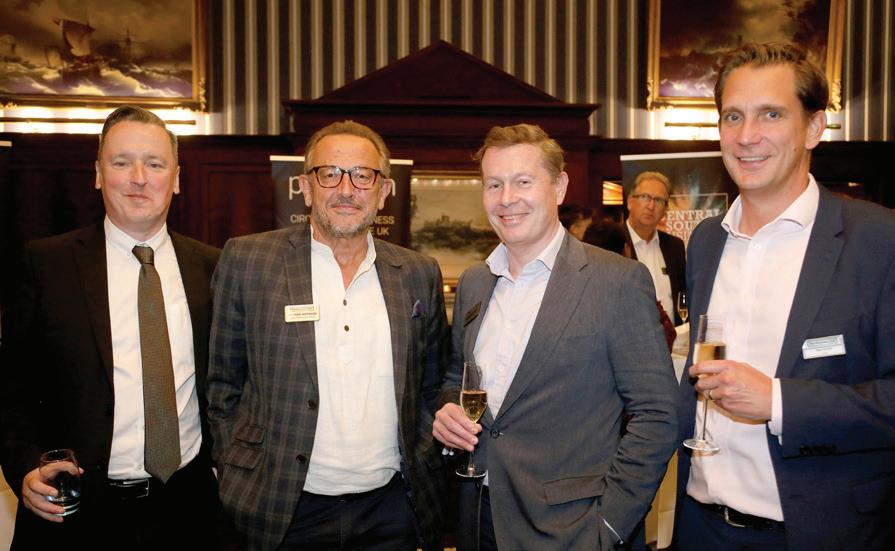


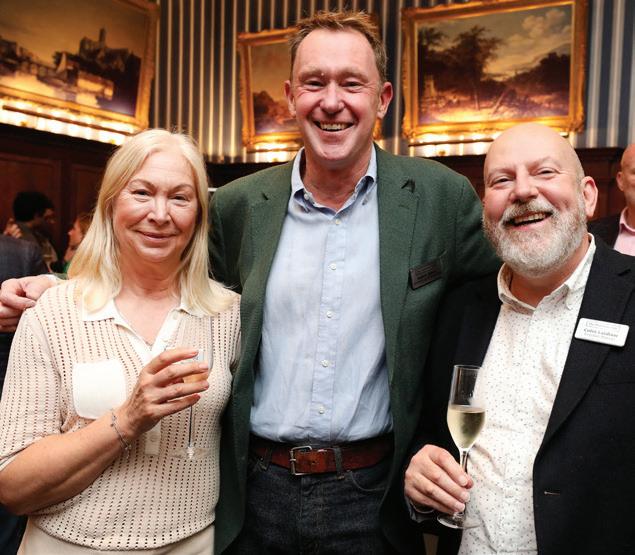
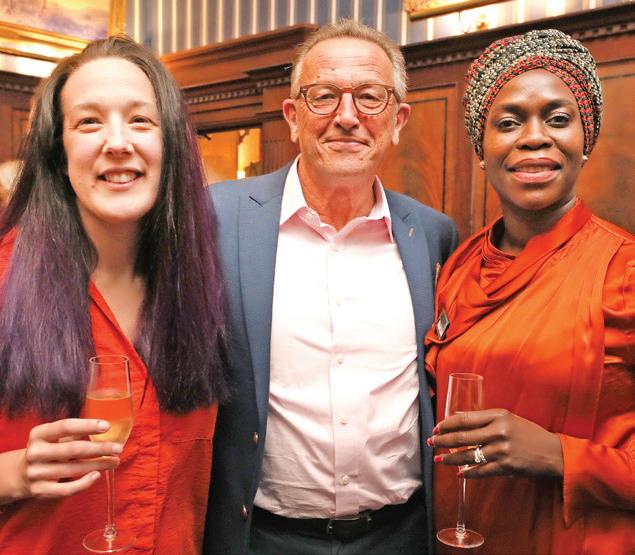

❜❜ BAILEY AND FRENCHPlatinum Barry Carden, Partner, Galloways; Nigel Lambe, CEO, Sussex Innovation; Neil Laughton, CEO, Laughton & Co; Rob Clare, Director, Innovation Capital Team Donna Holland, CEO, Rockinghorse Children’s Charity; Maarten Hoffmann, Managing Director, Platinum Media Group; Senda Kavindele, Senior Partner, KPMG Lesley Alcock, Commercial Director, Platinum Media Group; Dr Adam Jones, Principal Lecturer, University of Brighton; Colin Laidlaw, VAT Director, Kreston Reeves Maarten Hoffmann, Managing Director at Platinum Media Group; Kirsty Sadler, Regional Director at Lloyds Bank John O’Connor, General Manager, Watches of Switzerland; Maarten Hoffmann, MD, Platinum Media Group; Jonathan Grant, Partner, DMH Stallard LLP; Neil Kester, Financial Reporting Director, RSM UK David Boosey, Partner, MHA MacIntyre Hudson
Businesses across the region can now participate in the examination of London Gatwick’s growth plans, and submit their views to the Planning Inspectorate

London Gatwick’s application to bring its Northern Runway into routine use, alongside its Main Runway, was accepted for examination by the Planning Inspectorate on August 3rd 2023.
Businesses across the region, along with members of the public, including local residents and other stakeholders, have until 11.59pm on October 29th 2023 to register with the Planning Inspectorate and provide a summary of their views on the airport’s application.
Relevant representations must be made on the Planning Inspectorate’s Registration and Relevant Representation Form, which can be found on their website.
Those who register will become an ‘Interested Party’ and will be kept informed of progress of the examination. Once registered, there will also be the opportunity to provide further representations during the examination phase.
The Planning Inspectorate provides further guidance on how to register and make a relevant representation on their website here.
Sally Brown, General Manager of Gatwick Diamond Business, says the membership organisation will be backing the plans: “London Gatwick is not just an airport, it’s a pillar of our local economy, providing jobs, opportunities and driving investment across a range of industries.
Along with our members, we understand the important role the airport plays in ensuring we can all thrive.”
By investing in its long-term future, London Gatwick will also enhance the crucial economic role it plays by creating around 14,000 new jobs and injecting £1 billion into the region’s economy every year. This growth will not only lead to increased jobs and employment activity on the airport site, it will also bring wider benefits to tourism, trade, supply chains, and other business opportunities.
This forward looking and low impact plan aims to leverage the airport’s existing infrastructure to unlock new capacity and improve airport resilience in line with current government policy. The scheme will be privately fi nanced with a careful mitigation plan put in place to reduce environmental and other impacts.
❛❛ This forward looking and low impact plan aims to leverage the airport’s existing in frastructure to unlock new capacity ❜❜
Tim Norwood, Chief Planning Officer, London Gatwick said: “We are pleased that our planning application to take forward our Northern Runway plans has been accepted for examination by the Planning Inspectorate. Businesses, residents and other stakeholders now have the opportunity to make their views known and take part in the examination by registering their interest with the Planning Inspectorate.”


Alongside the airport’s low-impact plans to bring its existing Northern Runway into routine use alongside its Main Runway, London Gatwick has also recently published details of a six-year capital investment programme.
This sets out significant improvements to develop and enhance airport infrastructure and facilities, while also meeting the airport’s sustainability goals. The programme has been consulted on and agreed with airlines, and includes:
n Investing over £250 million to meet the commitment to become a net zero airport by 2030 (for Scope 1 and 2 emissions), including replacing over 100 gas boilers.
n A £120 million-plus extension to the existing Pier 6 in the North Terminal to provide eight new pier-served aircraft stands.
n A £70 million programme to rehabilitate airport taxiways, with airfield resilience improved further with a new Rapid Exit Taxiway, reducing runway occupancy and aircraft taxi times.
n A new £44.2 million, 3,250 space new multi storey car park in the North Terminal, due to open in Autumn 2024.
n A £10-million pound-plus redevelopment of the North Terminal departure lounge, due to complete in 2024.
Information on the progress of London Gatwick’s planning application can be found on the Planning Inspectorate website https://infrastructure.planninginspectorate.gov.uk/ projects/south-east/gatwick-airport-northern-runway



London Gatwick has been one of many businesses and organisations to continue to call on the Chancellor, Rt Hon Jeremy Hunt MP, to reinstate tax-free shopping for international visitors to the UK, after it was scrapped in 2021.

Part of the government’s rationale for abolishing the scheme was that it ‘cost £2 billion per year to administer’ –an estimate debunked by a recent study from Oxford Economics. The study has demonstrated that reinstating a tax refund scheme would actually provide a £340million boost to the UK Exchequer every year, with EU visitors also able to benefit.
A further study by the UK Travel Retail Forum (UKTRF) and the Association of International Retail (AIR) shows that pre-COVID, the scheme was used by around 4.8 million people - 30% of all non-EU visitors – which is three times greater than the Treasury’s estimate. Many of these were from high-spending markets such as Asia, the Middle East and the USA – all of which have direct flights to London Gatwick.

The airport alone has seen an 8% decline in spend within its fashion retail outlets since tax-free shopping was removed, and a 3% decline in overall spend across the airport’s retailers. This translates into millions of pounds in lost revenue.

And it’s not just aviation that is affected. Based on figures from the British Retail Consortium (BRC), tax-free shopping supported 70,000 jobs across the whole of the UK. And that doesn’t consider the thousands of indirect jobs, including those in hotels, restaurants and attractions. Conversely, tax-free shopping is still available in all EU countries, diminishing the attractiveness of the UK as a holiday destination.
That means fewer people staying in hotels, visiting tourist attractions, buying souvenirs, eating out in restaurants, or treating themselves to a night at the theatre.


A study by Oxford Economics surmised that the reintroduction of tax-free shopping would attract more than 1.6 million extra visitors to the UK in 2025/26 and stimulate an extra £2.8 billion of tourist spending.

Thanks to the work of Henry Smith MP, Sir Geoffrey Clifton-Brown MP and the Future of Aviation Group of MPs and Peers, Parliament debated this issue twice upon its return from summer recess. London Gatwick will continue to lend its voice to the growing campaign for tax-free shopping to be reinstated in the Chancellor’s Autumn Statement.
www.gatwickairport.com
The Gatwick Diamond Business Awards celebrate people and businesses who have shown innovation and inspiration in their work, and have demonstrated a real commitment to the region. The Awards have become one of the most prestigious business occasions – celebrating the best of the best across the Gatwick Diamond.
Entry Period: 4th October - 17th November 2023
Awards Night: 21st March 2024
For more information, visit: WWW.GATWICKDIAMONDBUSINESSAWARDS.COM
@gdbizawards
Misogyny (noun) dislike of, contempt for, or ingrained prejudice against women
Sexism (noun) prejudice, stereotyping, or discrimination, typically against women, on the basis of sex
Two definitions of very similar unpleasant social mindsets. Even at the most basic level of articulacy, the fact that there are neo-synonyms to describe an aversion to women is in itself pretty repulsive.
Misogyny in the workplace was brought front and centre to the world’s attention – more so than usual – this summer when the Spain women’s football team, brilliantly won their first ever FIFA Women’s World Cup in Sydney, Australia.
On August 20th, as the players were coming up to receive their medals, having defeated England in the Final, Luis Rubiales, President of Real Federación Española de Fútbol (RFEF) – the Spanish FA – and part of the presentation party, grabbed Jenni Hermoso roughly on the both sides of her head and planted an unwanted kiss on her lips.

As if this wasn’t bad enough, Rubiales, and the RFEF then went on to make false statements about the incident, including fabricating a statement from Hermoso herself. The incident, and the subsequent behaviour of the RFEF as whole, shocked not just the football world, but brought condemnation from outside football, including the Spanish government.
This was in addition to Rubiales grabbing his crotch when Spain scored. He was no more than ten feet from 16 year-old Infanta Sofía, second in line to the throne of Spain at the time.
Despite, in the intervening time, Rubiales protesting his innocence, claiming it was consensual, then a witch hunt, then blaming something called ‘ultrafeminism’, he eventually resigned on September 10th. His position had been made untenable as he had already been suspended on August 26th.
While it was a kiss on the lips that drove the issue into the stratosphere, it was always merely the straw that broke the camel’s back. The real issue was always the unequal treatment the women received compared to the men, and the lack of respect they received from all departments of the Spanish FA.
According to mental wellbeing specialists ‘I feel’
1
Restricting my participation because I’m the only woman
Being the only woman in the room is not an example of male sexism in the workplace, but establishing a work environment of overwhelming masculinity can be.

2 The glass ceiling
For some women, the glass ceiling is a reality proven by facts. This generates a feeling of helplessness, fed by the lack of references. No glass ceiling can be broken by believing that it cannot be broken in any way.
3 Working mothers’ guilt
Guilt is not an example of sexism at work either, but sexism in the workplace can lead to more intense regrets than they should be.
4 Mansplaining – or the infantilisation of women
For some reason, some men think that women are not ready to understand some issues the first time or do not consider them adult and insightful people. This leads them to what is known as “mansplaining”, a paternalistic and condescending attitude of the man towards the woman.
5 Sexual harassment at work

It is an abuse consisting of verbal or physical manifestations of a sexual nature that intimidate, offend, denigrate or pressure the person who suffers it, being a woman more often than a man. Victims of sexual harassment should remember that they are not the cause of the harassment.
6 Judging by clothing or general appearance
When their appearance becomes a recurring topic of conversation, the focus is always on how they look but not on how they work, even if it is with positive opinions about their appearance.
❛❛ The real issue was always the unequal treatment the women received compared to the men ❜❜
Football has always had an uncanny knack of mirroring the society it inhabits. Many in Spain are saying the behaviour of male authority in that country, not just in football but through all society, has to change. But everyone knows, at
least those who care, know that this is a global issue. There is barely a culture or society which doesn’t operate an overbearing patriarchy.
Most western European countries have gender equality laws – with the exception
8 Pregnancy as an occupational hazard
of one (yup, the UK) – as does the European Union. However, any laws are only worth the paper they are written on when it comes to enacting and enforcing them.
The caveat to that is – but, of course –the UK, which currently has no laws in place to give women the right to receive equal pay with men for doing the same job. That law was recently scrapped along with hundreds of others in the Government’s post-Brexit ‘EU Retained Law Bill’.
These laws included a regulation establishing the right of women to claim equal pay and terms with men if they ultimately work for the same “source” setting their employment terms and conditions. Now, these laws no longer exist on the UK statute books.
While Government ministers, effectively throwing the baby out with the bathwater in their zeal to repeal everything European, have promised to re-instate those laws, no timeframe has been placed on that.
7 Discrimination in recruitment processes

Many women are still perceived as lesser candidates due to prejudices about their character or how their performance will be affected by the family they have or will form in the future. If the decision has been made beforehand, there is not much to do, and there is always a reflection: maybe one doesn’t want to belong to a company that treats women like this.
Fear of telling the company that you are pregnant or fear of not being able to progress in your career if you become pregnant may be due to sexism in the workplace. A company that functions well does not see that its employees have children as a problem. However, not all companies work this way.
9 Family care: double shift
Although some families are quite well organised, family care tasks fall more heavily on women than on men. This makes it difficult for many women to balance work and family life. It stresses them out and makes them feel used.
10 Excessive “toxic masculinity” during pre-meetings
In the moments before a meeting, or during the meeting, for example, with external male clients, an exclusionary atmosphere can be created, based on allegedly ‘bloke’ topics of conversation that leave women out.

11The need to justify the achievements more than men
In particular work contexts, the explanation of women’s professional achievements is related to all kinds of excuses, rather than their merits. Women should not have to spend their energy deconstructing colleagues’ prejudices, nor justify their merits.
12 Gender pay gap
Sexism in the workplace strengthens beliefs that women’s work is not worth as much as they thought it was or that it is, but there is no point in claiming it.
It merely highlights the disdain with which many aspects of authority treats women, whether that’s governmental, judicial, commercial, or every day social. Inequality in the workplace can take several forms. The prejudices can range from the grotesque example given above – in full public with mendacious, cowardly responses afterwards – to the every day institutional practices, almost all of which are pretty archaic, but perversely, are also alive and kicking…
A few gender inequality examples to show the breadth of this topic:
n Unequal pay: Irrespective of the laws (currently suspended) on equal pay, there is gender pay reporting. Sadly, it often comes across as merely a box-ticking exercise, even when companies must follow government guidelines regarding this matter.
n Unfavourable recruitment strategy: This can include questions about whether a female candidate intends to have children, or suggesting in your job specification that the role is more for men. This rule applies to age, ethnicity, disability and all other social aspects.
n Different opportunities: If your business has career progression opportunities that favour men over women.
n Redundancies: Ending a female employee for making a claim of unequal treatment at work – in any form.
n Bias: Showing preferential treatment towards male colleagues over female ones, such as in promotions or day-to-day conversation.
n Sexual harassment: See above on this one. Not only is sexual harassment common, the understanding of what qualifies a sexual harassment is often missing. Add to this an act of gross misconduct, this behaviour towards men or women can have serious consequences.
n Holding sexist views: Promoting bigoted views about men or women, such as outdated gender stereotypes in any form. It can make itself known subtly as above, or as part of a casual, or even deliberate conversation which seeks to undermine colleagues on the basis of gender.
Types of gender inequality can vary dramatically between men and women, and it’s not all a one-way street, but history has shown the vast majority of the direction of traffic. Any decent Human Resources department would insist that company bosses stay vigilant, and have clear policies on how to expect employees to behave in around their working environment.
There is something called Equal Pay Day, a symbolic date and event created to highlight wage inequity. It fell on March 24th this year. This day shows how far into the next year – 83 more days in 2022 – women need to work just to be able to earn the same that men earned in the previous year.
For official UK figures, the 2022 mean GPG (the difference between
men’s and women’s average hourly pay) is 5.45% and the median is 9.71%. In monetary terms, the mean hourly difference in ordinary pay is £1.44 compared to £1.48 in 2021, while the median hourly difference is £2.41 compared to £2.68 in 2021.
There is always a caveat when calculating these fi gures, and in some cases, can be slightly misleading. The calculation is across the board. What is doesn’t take into account is the number of women in more senior positions in comparison to men, and hence, a higher salary.
And this is where we return to the historical sexism within commerce. Not only is women’s pay lower (despite that being illegal), there are still fewer opportunities being made available for women to be promoted.
❛❛ Not only is women’s pay lower, there are still fewer opportunities being made available for women to be promoted ❜❜
Worryingly, while the RFEF is slowly having a clear out, the sexist culture still remains within the organisation. The pace at which the RFEF moved to support its female players – some of whom still refuse to play for their country until systemic change is in place – was abysmal, and yet
so many are merely shrugging their shoulders.
The world’s attention may be on the RFEF, but it’s merely indicative of entire swathes of commercial, sporting and social culture which, even with enforced legislation in place, is still stuck in the Dark Ages, and will promote and excuse misogyny on a whim.
❛❛ The pace at which the RFEF moved to support its female players was abysmal ❜❜By Joseph Bradfield, Sussex Innovation

Sussex Innovation is home to a cluster of organisations from the health and wellbeing sector. From working with drug development companies, data analysts, digital application developers, medical writers and device manufacturers, we see first-hand the complexity involved in pushing forward new approaches and helping to maintain public health.
Throughout September and October, representatives of our team have been involved in a series of partnership workshops held at the University of Sussex and led by Deputy Pro Vice Chancellor, Professor Debbie Keeling. The aim of this project is to co-create a model that supports place-based health innovation in response to healthcare needs.
These focus groups brought together a mix of people from across Kent, Sussex and Surrey, including local government, the NHS, academic researchers and commercial healthcare enterprises. Participants were asked to consider what problems and challenges exist within our current system that stood in the way of their
vision of health innovation, and what the potential solutions might be.
“We brought these different stakeholders together to problem-solve around what a place-based health innovation ecosystem could look like and what difference it would make to people’s lives,” said Nora Davies, External Stakeholder Engagement Advisor at the University of Sussex.

“What does ‘place’ mean? How can we meaningfully involve people in a ‘place’? Which health innovations could respond directly to their needs rather than assumptions, and can an innovation ecosystem be developed to support this? The aim of these workshops is to agree on a place-based innovation model that can be translated into practice.”
Healthcare provision in the UK has been under strain since the Covid-19 pandemic, as hospitalisations reached an unprecedented level. The pandemic and ensuing vaccination roll-out had a knock-on effect on expenditure throughout the healthcare sector, and left significant disruption in its wake. Many patients deferred preventive care, creating backlogs in the system, while staff shortages increased due to burnout and the ongoing effects of Brexit.
❛❛ Health needs are diverse, complex, and different from region to region ❜❜
Although it is a challenging time, this disruption offers fertile ground for innovation. There is widespread recognition of how vital a wellfunctioning health service is, and an appetite to understand how we can do things more effectively – the perfect conditions for new ideas to take root.
We’ve supported several local projects in recent months centred on the concept of ‘Health Hubs’; a space for bringing together various different aspects of health and wellbeing provision under one roof. Health hubs might include local NHS primary care services alongside a variety of other services, such as community space, mental health and wellbeing counselling, or leisure and fitness facilities.
The model is part of a move towards holistic healthcare, recognising that ensuring the health of communities is a
complex and multifaceted challenge. Bringing services together under one roof enables doctors to access a wider range of referral options for their patients, as well as creating more proactive opportunities.


By giving local populations more autonomy over their physical and mental health, a portion of serious health conditions may be prevented from ever developing - in turn meaning that fewer people need to see their local GPs, and those GPs can offer more time and care to those who need it most.
In focus group conversations with healthcare professionals, we’ve heard that day-to-day contact between different arms of the health and wellbeing sector is also crucial for improving outcomes. In much the same way that bringing together growing businesses at an Innovation Centre helps to foster collaboration, creating more touchpoints for healthcare providers to meet and interact helps to foster more targeted interventions.
Health needs are diverse, complex, and different from region to region. Each area might see higher levels of deprivation or affluence, differing access to housing, employment, education or social care, a predominantly urban or rural environment, a homogenous population or one with major inequalities. This is why local health and wellbeing hubs need to be designed from the ground up, in consultation with local communities and in response to what is needed most.
This summer, Sussex Innovation delivered a research report for the SPACES programme (Strategic Property Asset Collaboration in East Sussex), identifying and sharing some of the key trends observed in successful health and wellbeing hubs around the UK. We also offered our recommendations for how to establish a similar programme in the region in a way that will be both commercially sustainable and deliver the biggest possible social impact. We look forward to playing a part in a happier and healthier future for our local community.
www.sussexinnovation.co.uk

❛❛ Although it is a challenging time, this disruption offers fertile ground for innovation ❜❜
JUNE 3RD – 5TH 2024
THE BRIGHTON DOME AND CORN EXCHANGE
... AND ANNOUNCING THE 2024 WIRED SUSSEX TECH AWARDS


EDUCATION n EMPLOYMENT n COMMUNITY n INVESTMENT
CREATED BY
POWERED BY PLATINUM MEDIA GROUP


MHA is new to Gatwick, having opened a new office at the start of 2023, but we are by no means new to helping travel businesses deal with the problems that VAT throws at them.
 By Sue Rathmell, VAT Partner, MHA
By Sue Rathmell, VAT Partner, MHA

I am a VAT specialist with over 30 years’ experience advising businesses on their VAT obligations. I have a team of eight VAT specialists in Gatwick, and it is part of MHA’s national VAT practice which comprises more than 20 specialists. We want to help businesses in Sussex and Surrey avoid nasty VAT surprises.
For many businesses, VAT doesn’t present too much of a problem. VAT is charged on sales at 20%, and VAT incurred on costs is recovered. Simples! However, for tour operators who buy in and sell on travel services to consumers, VAT is very difficult indeed. Tour operators use what’s called the Tour Operators’ Margin Scheme (or TOMS for short) to calculate how much VAT they owe. Instead of paying VAT on the sales value, they pay VAT on the margin, but only the margin on UK holidays. Now that the UK has left the EU, the margin on EU holidays is zero-rated, meaning no VAT must be paid.
❛❛ VAT isn’t so easy for travel agents either ❜❜
The TOMS scheme was originally a simplification under EU VAT law and meant that tour operators did not have to register for VAT everywhere they sent travellers. Unfortunately, with the UK leaving the EU, UK tour operators have lost this protection and the EU is currently considering requiring non-EU tour operators to register in every EU member state that they send travellers to, and pay local VAT on transport and hotels. This will require changes to the EU VAT legislation, and every EU member state has to agree to the changes so it might be some time before these new rules apply. We hope so.
VAT isn’t so easy for travel agents either. HMRC often tries to say they are tour operators acting as a principal, buying-in and selling-on travel services, rather than acting as an agent, arranging a supply between two principals. As principals, they would have to use TOMS, paying VAT out of their margin. Contracts are often poorly worded and contradictory. We saw years of litigation by HMRC and Secret Hotels over this
very issue which ended with the UK Supreme Court agreeing with Secret Hotels and throwing out HMRC’s case.
So, what can you do if you are operating in the travel sector? Pin down the VAT treatment of your supplies. Don’t leave an inch of room for HMRC to argue that the VAT treatment is different. Make sure that the contracts you have with suppliers and customers are clear and unequivocal. Get advice from a VAT specialist like me who can review contracts, your website, company terms and conditions, and make sure that you are in the clear. A dispute with HMRC can be costly and take a lot of time to resolve. So review your VAT position before HMRC does!

If you’re not in the travel sector then don’t worry, we can help you too. We advise businesses in all sectors from electronics to entertainment, and hotels to healthcare. We can help if you have a dispute with HMRC, if you are having trouble importing goods into the UK or if you don’t know whether you should charge VAT on your supplies.

• Sue Rathmell
sue.rathmell@mha.co.uk
• Naomi Quant naomi.quant@mha.co.uk
• Michael Samuel-Bryan
Michael.samuel-bryan@mha.co.uk

❛❛ For tour operators who buy in and sell on travel services to consumers, VAT is very difficult indeed ❜❜
In an era dominated by technological advancements, the notion of “Big Brother is Watching You” has transitioned from dystopian fiction into a reality within workplaces.
 By Pam Loch of Loch Associates Group
By Pam Loch of Loch Associates Group
From biometric clocking-in systems, to monitoring staff through mediums such as closed-circuit television (CCTV), email and key stroke tracking, desk and movement monitoring –employers now have such a wide range of choice. However, is monitoring staff micro-management verging on bullying, or an essential tool to manage people nowadays?
Through monitoring using CCTV surveillance, employers can pinpoint bottlenecks in production lines, identify development needs or support as required, and assess the impact of different shifts on production rates. Armed with these insights, management can implement process improvements, such as adjusting shift schedules or fine-tuning routines. These measures optimise workflows, minimise delays, and lead to a more resource-efficient operation.
Activity monitoring can extend to software which logs every keystroke, mouse click, internet search, social media use and can even take screenshots and provide live video feeds to ascertain what someone is working on. For employers, it means they can track progress and ‘keep an eye’ on staff, especially when remote working. This data-driven approach could also help employees’ development by identifying coaching and training
needs. However, these potential gains must be considered alongside the legal, ethical and privacy implications associated with surveillance.
Workplace monitoring usually involves processing personal data and is therefore governed by the General Data Protection Regulation 2016 (GDPR) and the Data Protection Act 2018. If the employer falls into the category of being a public authority, then they also have to take into account Article 8 of the European Convention on Human Rights and the Human Rights Act 1998. This is because gathering information on staff at work involves personal data and could infringe the person’s rights. There are also potential contractual implications as there is a duty of mutual trust and confidence between the employer and the employee. Non-compliant monitoring at work could result in a breach of this duty leading to constructive unfair dismissal claims.

Recognising the growth in monitoring and the need to protect personal data, the Information Commissioners Office (the ICO) launched a consultation on draft guidance on monitoring at work. This guidance can be found on the ICO’s website at www.ico.org.uk.
The ICO makes it clear that any decision to monitor staff should ‘involve careful balancing between the business interests of an employer and the workforce’s rights and freedoms in relation to their personal data’. In other words, simply because you have the tools to monitor staff, you still must consider if it is the best way to achieve your objectives.
To lawfully monitor staff, an employer has to be able to identify one of six lawful bases to justify it. The most likely lawful basis an employer can rely on is Legitimate Interest – where the monitoring is necessary for legitimate interest unless the risks to the employee’s rights overrides them. However, employers will have to carry out an assessment as to whether or not they could achieve their objectives in a less intrusive way. If they could, then they will not be able to rely on the legitimate interest basis to justify the monitoring.
Monitoring workers will often include collating sensitive data which brings additional obligations with it. This data being collected is called the ‘special category’. This means that it needs more protection because of the nature and the risks of harm to the person if there is inappropriate disclosure or use of the data. Employers will have to identify a special category condition, from a list of ten, to lawfully process the data.
Employers must not only carefully consider the data protection implications of monitoring but also the potential impact on the employer –employee relationship. The pervasive nature of constant surveillance can infringe upon employees’ rights to personal space and create feelings of discomfort and unease.
Trust erosion can emerge as a major challenge as monitoring can foster an atmosphere of distrust
between employers and employees, undermining open communication and collaboration. If not appropriately managed, monitoring tools can lead to a culture where employees feel closely scrutinised, curtailing autonomy and stifling independent decision-making. The pressure of performing under surveillance can contribute to heightened stress levels, impacting employees’ mental well-being.

In addition, the issue of data security cannot be overlooked. Workplace monitoring systems will gather valuable data. Workplaces are not immune to cyber threats, exposing sensitive employee data to potential breaches and unauthorised access.
The juxtaposition of the pros and cons of workplace monitoring necessitates a careful evaluation of whether the benefits outweigh the risks. While the advantages hold an appeal, they must be balanced against the potential privacy infringements, trust erosion, and stress associated with monitoring.
A considered and measured approach which emphasises transparency, proportionality, and employee consent can alleviate many concerns associated with monitoring. The decision to use workplace monitoring methods should therefore be guided by a well-informed consideration of both the operational benefits and the potential impact on employee wellbeing and privacy.
Pam Loch, Solicitor and Managing Director of Loch Associates Group www.lochassociates.co.uk
❛❛ Workplace monitoring usually involves processing personal data and is therefore governed by the General Data Protection Regulation 2016 (GDPR) and the Data Protection Act 2018 ❜❜


We pride ourselves on our ability to provide independent, sophisticated and bespoke financial advice.

Rob Day is an MDHUB success story. A member in the early days of the hub100, Rob has since joined the MDHUB team, and now facilitates workgroups for its members.
We chat over Zoom, as he lives yearround in Jersey. In the background, I can see a freshly painted seascape; evidence of a healthy work-life balance he has carved for himself since exiting his business.
Rob first met Fiona Shafer, current Managing Director of MDHUB, while she was consulting for Sussex Enterprise. The team at Rob’s web agency Liquid Light was at a crossroads, having to make big decisions about whether to scale up. “Fiona was empathetic and supportive,” Rob states. “She helped me and the team to make the right choices for the business.”

As a result of Fiona’s intervention and help, Rob subsequently made the decision to join MDHUB (then ‘the hub100’). Taking part in regular peerto-peer workgroups, he was able to develop his knowledge and confidence in order to improve Liquid Light.
“If things are going well, you don’t think you need peer learning sessions. But you will have good and bad days, and on those bad days, the peer support you get in these sessions is everything.”
During the period where he was looking to exit his business, Rob received a huge amount of support from something within MDHUB called the ‘Escape Committee’, a regular workgroup focussed specifically on business exiting. Cutting a long story short, he eventually exited in a successful manner in April 2016, before spending time going travelling with his wife, Evelyn.
With his batteries recharged, Rob returned to MDHUB as a facilitator and business coach. Alongside a number of other regular workgroups, he now runs the Escape Committee, helping the next generation of business
owners to negotiate their own exits. For those peers in that situation, he has become someone to turn to; someone who had, colloquially, ‘been there, seen it, done it…’
It is something he finds an enormous privilege. It also helps him stay connected to the south east from Jersey. Best of all, he feels, “I get to do it in a professional capacity, with the support from all of these inspirational business leaders.”
MDHUB matches Rob’s values and, all the while that continues, he believes he’ll be happy to spend his time with them. “The sense of integrity, compassion and care is 100% of MDHUB’s DNA; you see that in the board meetings as much as you see it in the delivery. There are not many places in the business world where it’s not shrouded in hubris and ego.”
❛❛ You will have good and bad days, and on those bad days, the peer support you get in these sessions is everything
While MDHUB provides a space to champion and support members in times of growth and success, it also provides a safe space for business leaders who are struggling. “Asking for help takes courage.”
As one of his many workgroups, Rob runs Wildcards, one-off workshops, where members can talk openly and freely, and discuss new ideas. ‘Tech 101’ is one of Rob’s Wildcards, borne of the sense that technology is going through one of those big ‘aha’ moments – the rise of Artificial Intelligence (AI).
The workgroup allows him to, as he puts it, ‘switch the light on’ for business leaders, and discuss the newest developments in the field, including how this could change the way we work.
For Rob, AI is the thing to watch for business leaders. “It’s affecting so many spaces: e-commerce, SEO, social media, content writing; there’s not an industry I can think of where it won’t have some impact.” For those wishing to dip their toe into these worlds, he suggests ChatGPT and Midjourney as starting points for anyone looking to learn about what AI can do.

We also touched on the cost of living crisis, Brexit, and rapid tech developments. All of these are perceived to be making for a very unstable environment. Rob’s one piece of advice for surviving this climate was, “Don’t do it alone. It’s a lonely place to be an MD, and it’s impossible to have all the answers.”
As part of this, he suggests implementing an advisory board; having external support from mentors can help you make the best decisions for your business. “It’s about support,” Rob concludes. “Being with MDHUB means you’re not alone.”
If you would like to hear more about the peer groups that Rob facilitates, please email Rob at rob@mdhub.co.uk
If you are interested in finding out more about the MDHUB, please visit www.mdhub.co.uk
Email MDHUB Directors: Fiona Shafer: fiona@mdhub.co.uk or Phil Green: phil.green@mdhub.co.uk

❛❛ For those peers in that situation, he has become someone to turn to; someone who had, colloquially, ‘been there, seen it, done it ❜❜
Could PAYE Settlement Agreements stop your employees from experiencing unexpected tax bills? This is something to consider, suggests.
George Cannon, Private Client Tax Manager of Kreston Reeves
Businesses are suffering increased costs and employers are looking for various ways to reward their employees and keep them engaged beyond pay rises and bonuses. The issue, however, is that a lot of these alternative methods can be caught by the benefit in kind (BIK) rules. BIKs need to be reported on a form P11D and the employees concerned are taxed on the cash equivalent of the BIK provided – which is not ideal when the aim of the benefit was to provide an additional reward to the employee concerned. A PAYE settlement agreement could be the answer.
A PAYE Settlement Agreement (PSA) allows employers to make one annual payment to HMRC to cover the Tax and National Insurance Contributions (NIC) due on selected minor, irregular or impractical expenses or benefits that they provide to their employees.
As most non-cash benefits provided to employees will be taxable on the employee, a PSA can be a great way to cover the Tax and NIC due on the employee’s behalf and avoid upsetting them with an unexpected tax bill.
PSAs work best on items where it is not the employer’s intention for there to be a Tax or NIC consequence for the employee. For example, an employer may provide an employee with a long service award that does not meet the criteria to be provided tax free.
Whilst the employer’s intention is to provide its employee with a gesture of its appreciation for their years of hard work, an unexpected tax bill for the individual is likely to undo some of the goodwill generated from the gift. By including the gift on a PSA, the employee will not be liable to Tax or NIC and the employer retains the goodwill of the employee.
PSAs are often used to cover items such as ‘employee of the month’ awards, incentive schemes or even staff entertaining such as Christmas parties that have exceeded the annual £150 per head tax-free limit.
❛❛ As most non-cash benefits provided to employees will be taxable on the employee, a PSA can be a great way to cover the Tax and NIC due ❜❜
An employer can apply online for a PSA, or an agent can do so on their behalf. Once HMRC has checked and approved the application, the employer will receive a confirmation email or letter, with the PSA following shortly after by post. The agreement will then continue until either the employer or HMRC apply to change the agreement or cancel it.
The PSA application needs to be made by July 5th following the first year that it applies to, although if a PSA is applied for in advance, it can increase the types of items that can be included on the form. The PSA form itself will then need to be completed and submitted by July 31st, with the Class 1B NIC payable by October 22nd (if paid electronically) following the end of the tax year.
Whilst it is beneficial for the employees concerned to have certain items included on a PSA to avoid a Tax or NIC liability, it can be expensive for employers. Not only are they paying the
Tax and NIC on the employee’s behalf, they are also required to gross up these payments to take account of the added benefit of paying these amounts on the employee’s behalf. The business will then pay Class 1B NIC on the total amount calculated at a rate of 13.8% for the 2023/24 tax year.

❛❛ PSAs are often used to cover items such as ‘employee of the month’ awards or incentive schemes ❜❜
Rebecca Thornley-Gibson outlines how far firms can go and wonders whether recent comments by business secretary, Kemi Badenoch, may herald a change

Employees’ conversations – spoken, written and online – are part of workplace communications, but the topic range can be broad, and not always welcomed by everyone. Problems can arise when employees candidly share their views and beliefs, and exercise what they see as their right to freedom of expression.

Opposing employee views carry risks, not only in creating tension, but also the potential for Equality Act 2010 legal claims. The dilemma facing employers is whether they need to become more prescriptive on what can and can’t be said at work, or whether this will stifle natural conversation and create an environment that is considered sterile and unattractive.
Businesses need to set standards of workplace behaviour, and most do by having codes of conduct and policies covering what they expect from employees. Employer values and expectations are also reflected in diversity and inclusion measures, but positive and well-meaning actions to be inclusive can create unintended consequences and negative impacts for some companies.
❛❛ Businesses need to set standards of workplace behaviour, and most do by having codes of conduct and policies ❜❜
Recent high-profile discrimination cases concerning protection of philosophical beliefs, or lack of, demonstrate the risks for workplace environments allowing an exchange of conflicting views. Such cases, including gender-critical belief and veganism, will lead to employers reviewing their approach to the extent they need to get involved in managing workplace conversations.
Some businesses may feel stifling workplace conversations has a damaging effect on the workplace culture, but when one person’s healthy debate is perceived as another person’s harassment, the risk management approach of most organisations will lean towards more control over conversations.
The Equality and Human Rights Commission (EHRC) narrative on harassment is likely to be read by employees as not putting a particularly high bar on being able to prove harassment. If the behaviour is unwanted and the employee
finds it offensive, provided the claimant has a protected characteristic and can show the behaviour had the purpose or effect of violating their dignity, or of creating a degrading, humiliating, hostile, intimidating, or offensive environment, the claim will be successful.
As unwanted behaviour, according to the EHRC guidance, includes spoken or
written abuse, offensive emails, tweets, and website comments and “banter that is offensive to you”, it is not surprising that HR is regularly dealing with harassment allegations arising from workplace conversations.
An increased level of control can result in challenges from employees who will say that they are scared of saying the ‘wrong thing’ and that they are fearful of disciplinary action if they act a certain way, or make a comment that is not well received by a colleague. However, employers are vicariously liable for the acts of their employees, Moreover, statutory liability requires employers to accept they are responsible for not only communicating expected standards of behaviour, but taking action and policing conversations in the same way they would with any other behavioural concerns.
Recent comments by business secretary, Kemi Badenoch, acknowledging concerns about how the Equality Act is being used by some groups, will be of little comfort now to HR teams which are dealing with grievances and claims arising from conflicting views. However, her comment that “the Equality Act is a shield, not a sword” and her stated commitment to “bringing people together, rather than atomising them into identity groups, and helping businesses to focus on delivering healthy working environments, rather than becoming social regulators,” suggests that businesses shouldn’t have to take on the role of regulating the conversation. Perhaps the brakes are being put on the creative use of the Equality Act for some belief claims.
Rebecca Thornley-Gibson is a partner at DMH Stallarddmhstallard.com

❛❛ Some businesses may feel stifling workplace conversations has a damaging effect on the workplace culture ❜❜
For any sale transaction, you will need legal and tax support, with many deals involving corporate finance

If you need a buyer to be identified, or introduced, then you will need a corporate finance (CF) advisor. Not all CF advisors are the same; each come with their own background/skill set, connections and access to the market, and fees. Be wary of super slick marketing/sales tactics, as it can mislead (after all, CF advisors are skilled at selling!).
We still see many deals arise, following a direct buyer/investor approach to the target business. In that situation, the target has a choice, whether or not to retain a CF advisor. When I am asked by clients what they should do in this situation, I tell them the decision should be dictated by the nature of the deal:
n If your buyer is a complex/well resourced (PE or international corporate), with deep finance/analytical teams, you can easily be “outgunned” without a CF advisor on your team;

n If most of the cash is payable in cash on completion, and the structure/diligence straightforward, you may be able to manage with an experienced legal and accounting/ tax team.
Professional fees:
n Lawyers/tax advisors are often paid on a time basis, supported by an estimate. If the deal is straightforward, you pay less, but if it becomes protracted, you pay more. You can also ask for contingent, or fixed fees, which are becoming more common, but there is generally a price for the risk assumed by the advisor.
n Corporate finance advisors will work on a mainly contingent basis, if they find you a buyer/investor, receiving a higher success fee, often with a “ratchet”. The ratchet increases the percentage they receive of the sale price, above a target level.
n If the CF advisor is introduced to help manage and run a deal, where an offer has already been made, they will often work on a time basis; this can be a good option for a business which receives a direct approach, but where help is needed with negotiations.
Setting out to select the lowest cost professional team, is rarely sensible. You may pay less in fees, but you can lose far more on the deal, for instance greater (warranty) risk, a price reduction, or a buyer losing confidence and not completing. A strong advisory team will run an efficient process, ensure sellers are protected, and retain buyer/ investor confidence. It also helps to select an advisory team with credentials/experience at the right level in the market.
We would suggest you discuss these issues well ahead of a potential deal, so you are not selecting your professional team under pressure.
If you would like to discuss any of these themes further, please get in touch Mobile: 07912 087173 Email: Jonathan.Grant@dmhstallard.com
Outstanding legal advice for individuals, families and businesses.
We make it our business to know your business, working with you to add value and to deliver tailored legal services with energy and creativity whether you’re an established market leader or an ambitious start-up.






Your family’s security and wellbeing are your priority. And we have the legal skills and knowledge to support your plans and the challenges life brings.
Please call or email to discuss how we can help you:
03333 231580 enquiries@dmhstallard.com










There’s more to a Hurst education than academic excellence. Here, self-expression is positively encouraged. Children are inspired to explore. Invaluable years in our nurturing, enriching environment in which all children thrive, blossom and grow. Prepared. For life.




Outsourcing your finance function involves delegating the fi nancial tasks and responsibilities of your business to an external service provider. Essentially, instead of managing all the financial aspects in-house, you rely on the expertise and resources of a specialised team or company to handle them. This can include your accounting, bookkeeping, VAT, tax and a variety of other functions.
This process can bring you and your business many benefits, including;
An outsourced finance function can lead to significant cost savings as it eliminates the need to pay the combined costs that come with hiring a team of employees, such as salaries, national insurance contributions and holiday pay. In this case, you have the ability to easily scale up/down the level of service in response to ever-changing market demands, removing the need to commit to hiring and training a permanent team of staff. Whilst leveraging the services of an external provider, you can redirect these cost savings towards the other areas of your business which are more growth focused.
Outsourcing allows you to gain access to a team of experts who have a deeper knowledge and insights into finance regarding a number of different types of businesses. Working with various types of teams in a number of different sectors means you can incorporate the skill and experience needed to handle complex tasks whilst providing accuracy and compliance with regulations and any new legislations.
They can easily apply what they may have learnt elsewhere to your situation. This expertise can help you make informed financial decisions and eradicate any potential mistakes, which would be costly to the business.
By removing yourself from the day-to-day workings, you free up time that can be used to focus on the bigger picture, and other core activities that drive business growth and innovation to stay ahead of your competition.
As your business sees growth, existing financial processes may no longer serve their purpose, or you may find yourself needing additional support. By outsourcing your fi nance function, you can streamline your financial processes, implement the best practices, and take advantage of efficient technologies and robust systems. This can help to automate repetitive tasks, reduce manual errors and provide timely and accurate financial data reports.
Outsourced teams bring about flexibility in more than one way. For example, both remote and in-person working can bring their own benefits to a business. An outsourced fi nance workforce can adapt and fi t into your individual business dynamic with the ability to work remotely or in person, depending on your personal requirements.

Running an effective internal finance function can be a challenge especially when you are already concerned with a number of different areas of the business. Outsourcing a fi nance team can take the pressure off business owners and offer real value.
If you want to discuss outsourcing your fi nance function, get in touch.

www.hwca.com/accountants-esher
T: 020 8549 5137
E: esher@hwca.com
❛❛ Instead of managing all the financial aspects in-house, you rely on the expertise and resources of a specialised team or company to handle them ❜❜
The Education & Skills Partnership provides training and development solutions, through funded commercial and apprenticeship routes
We are Ofsted ‘Good’, and have been winners of Corporate Award Training Provider of the Year for the past two years. We thought we would share some insight for South East SMEs.
It’s been a challenging period for many businesses in the South East, but that doesn’t need to make it any less fun. Research from The Local Enterprise Partnerships and central government gives us some insight into how things have changed and how businesses have reacted in the South East:
n The tech sector in the South East of England was growing at a rate of approximately 6% annually, contributing significantly to job creation and digital transformation efforts.
n Businesses were investing heavily in digital initiatives, with an estimated £1.4 billion spent on digital transformation projects across various industries.
n Remote work adoption in the South East had surged, with approximately 55% of businesses offering remote or hybrid work options for their employees.

n Businesses allocated an average of 15% of their training budgets to upskilling employees in remote work technologies and best practices.
n Companies in the South East reported a 20% increase in diversity and inclusion training expenditures, reflecting a commitment to building diverse and equitable workforces.
n Women represented 45% of the total workforce in the region, with efforts to increase representation in leadership roles.
❛❛ On average, the cost of recruiting a middle management role in the South East of England typically ranged from £5,000 to £15,000 ❜❜
n An estimated 30% of businesses in the South East identified skills gaps as a significant challenge, with the most pronounced gaps observed in technology-related roles and specialised trades.
n Training budgets allocated for skills gap mitigation increased by an average of 12% year-over-year.
n The number of reported cyberattacks in the South East has risen by 25%, prompting increased investments in cybersecurity job roles and training programs.
n Businesses allocated, on average, 8% of their IT budgets to cybersecurity training and initiatives.
n Approximately 35% of the South East’s workforce were over the age of 50, highlighting the importance of age-inclusive job design and training programmes.
n Companies reported a 15% increase in offerings related to phased retirement and flexible work arrangements.
n Online learning and micro-credentialing platforms saw a 30% increase in enrolment in 2021, reflecting the growing emphasis on lifelong learning and upskilling.

n Employers allocated, on average, 10% of their training budgets to support employees’ continuous skill development.
n Mental health-related training programmes were offered by 60% of businesses in the South East, with an average of 5% of HR budgets allocated to employee wellbeing initiatives.
n Ergonomic job design changes resulted in a 10% reduction in workplace-related injuries and illnesses.
All of these issues have led to the need for your leadership teams to be more effective and capable of supporting your team to be the best they can be. If you lose your strongest team members through lack of skilled leaders, the impacts then multiply.
We have limited free courses available for SME businesses in the Coast to Capital and Greater London areas. These courses can be found through our website, but you might also commission a specific course if you have suitable numbers.
THIS OPPORTUNITY CLOSES ON NOVEMBER 23RD
Reach us through enquiries@esp-ac.uk to discuss your needs
On average, the cost of recruiting a middle management role in the South East of England typically ranged from £5,000 to £15,000. This cost includes expenses related to job advertising, recruitment agency fees, background checks, interviews, and any relocation or signing bonuses offered to the selected candidate. It doesn’t consider the drop in performance / sales whilst the replacement gets up to speed.
The recruitment process for a middle management role in the South East could take approximately six to 12 weeks. The process involves creating job descriptions, advertising the position, reviewing applications, conducting interviews, reference checks, and negotiations with the selected candidate. More specialised or senior roles might take longer due to the need for in-depth assessments and interviews.
The CIPD survey shows
n 45% of businesses have seen increased competition for skilled team members.
n 33% have increased what they do to grow their own talent.
n 30% say retention of talent is harder
n 39% say that there is a big increase in the number of poor quality applicants.
n 24% have increased their diversity in recruitment.
At The Education & Skills Partnership we only do two things:

n Improve your team members’ skills in the things that are important to the health of your business.
n Give your team the qualifications required to do the job.
We do these two things in partnership with you, and by using the most effective funding and delivery route.
It all starts with a conversation with one of our expert team members. Booking is easy, simply reach us on our website www.esp-ac.uk or use our enquiries@esp-ac.uk email.
❛❛ An estimated 30% of businesses in the South East identified skills gaps as a significant challenge ❜❜
CELEBRATING 35 YEARS OF THE REGION’S MOST RESPECTED AND BEST ATTENDED EVENT

















❛❛ Fantastic from start to finish... it would have been a lovely night even without the awards we won! ❜❜


❛❛ What a fabulous event. We had a brilliant night and looking forward to next year already! ❜❜ VERLINGUE


































When we launched our LawEasier service back in 2017, we were a law firm ahead of the curve. LawEasier uses a form of artificial intelligence (AI) that asks the questions that a lawyer would ask to create bespoke legal documents such as contracts, Wills and agreements.
Using technology meant that we could provide great value and immediate document creation for clients at any time they needed it, and not just when our offices were open.
Fast forward to today, and AI has emerged as a transformative force that is reshaping industries and businesses around the world. From enhancing customer service to optimising supply chains, AI is revolutionising the way companies operate and compete.
One of the most significant impacts of AI on businesses is the ability to provide enhanced customer experiences. Using AI-powered chatbots and virtual assistants, companies can offer 24/7 customer support, answer queries in real-time, and streamline the customer service process. These AI-driven solutions not only reduce response times but also free up human agents to handle more complex customer issues.
Furthermore, AI enables businesses to personalise interactions with customers by analysing vast amounts of data to understand their preferences and behaviour. This personalisation leads to higher customer satisfaction, increased loyalty, and improved customer retention rates. Companies like Amazon and Netflix have successfully leveraged AI to recommend products and content, resulting in higher sales and engagement.
AI empowers businesses to make datadriven decisions with unprecedented accuracy and speed. Advanced machine learning algorithms can analyse large datasets, identify trends, and extract valuable insights that humans may overlook. This enables business managers to make more informed choices across various aspects of their operations, such as marketing, sales, and inventory management.
For instance, AI-powered predictive analytics can forecast future demand for products, allowing businesses to optimise their inventory levels and reduce costs. In marketing, AI can analyse customer behaviour to suggest the most effective marketing strategies and allocate resources more efficiently. In short, AI-driven data analysis helps businesses stay ahead of the competition and adapt quickly to changing market conditions.
AI-driven automation is transforming business operations by automating repetitive and time-consuming tasks. Robotic Process Automation (RPA) and intelligent automation solutions are being employed across industries to streamline workflows and boost efficiency. These technologies not only reduce human error but also enable employees to focus on more creative and strategic tasks.
For instance, in the financial sector, AI-powered algorithms can automate the data entry and reconciliation processes, reducing the risk of errors and speeding up transaction processing. In manufacturing, AI-driven robots and machines can perform repetitive tasks with precision, leading to higher production rates and consistent quality. This automation not

only improves efficiency but also reduces operational costs, contributing to higher profitability.

AI is a catalyst for innovation, allowing businesses to develop new products and services that were previously unimaginable. AI-powered tools and technologies can assist in product design, simulate scenarios, and generate ideas for innovation. For example, in the pharmaceutical industry, AI can accelerate drug discovery by analysing vast datasets and identifying potential drug candidates more efficiently.
Furthermore, AI can help businesses stay ahead of market trends by monitoring social media, news, and customer feedback. This real-time analysis enables companies to adapt their products and strategies quickly, ensuring they remain competitive in rapidly evolving markets.
AI can play a crucial role in safeguarding businesses against cyber threats and fraud. AI-powered security systems
can continuously monitor network traffic, identify suspicious activities, and respond to threats in real-time. This proactive approach to cybersecurity helps protect sensitive data and prevents financial losses.
In the financial sector, AI is used for fraud detection, identifying unusual patterns in transactions, and alerting authorities to potentially fraudulent activity. This not only safeguards businesses but also enhances customer trust.
In conclusion, AI has the potential to revolutionise businesses across industries in numerous ways. From enhancing customer experiences and enabling data-driven decisionmaking to automating processes and optimising supply chains, AI is a transformative force that can help businesses thrive in a rapidly changing world.
To harness the full potential of AI, businesses must invest in talent, infrastructure, and data capabilities.
It’s essential to understand that AI is not a one-size-fits-all solution; its implementation should be tailored to the specific needs and objectives of each organisation.
As AI technology continues to evolve, businesses that embrace and leverage its capabilities will gain a competitive edge, drive innovation, and pave the way for a more efficient and prosperous future. The era of AI-driven business transformation is upon us, and those who seize the opportunities it presents will be the leaders of tomorrow.
At MWB, we are constantly looking at how we can make best use of technology to improve efficiencies, client service and service delivery. AI is a powerful tool in the kit bag, but it will never replace our expert legal advisors. It will, however, help them provide the best possible outcomes for our clients.
 Jason Edge, Marketing Director, Mayo Wynne Baxter www.mayowynnebaxter.co.uk
Jason Edge, Marketing Director, Mayo Wynne Baxter www.mayowynnebaxter.co.uk
❛❛ AI can play a crucial role in safeguarding businesses against cyber threats and fraud ❜❜
Founded in November 2021, Renew Risk is a spin-in from the University of Surrey providing the world’s first offshore wind farm insurance models. The start-up is also a member of Surrey Research Park’s incubation hub, SETsquared Surrey.

The company has been built using decades of know-how, expertise and experience of the University of Surrey’s Chaired Professor Dr. Subhamoy Bhattacharya, who is an expert in offshore wind and has authored three books on offshore windfarms. The technical know-how forms the basis of the products built by Renew Risk. Dr Bhattacharya is a Co-founder and Chief Scientist of Renew Risk.

Earlier in the year, Renew Risk attended one of the University of Surrey’s Angel investment events, S100 Club which helped kickstart an exciting year for 2023’s investment round. This funding round was led by strategic investor Insurtech Gateway with participation from ClimateTech fund One Planet Capital, the University of Surrey, and super angels Chris Adelsbach and Rahul Munjal.
As the world transitions towards green energy, the next ten years will see exponential growth in the offshore wind industry – expected to be a $1tn industry by 2040. This growth requires massive
institutional investment, yet the associated risks remain largely unmeasurable.
Renew Risk provides robust risk assessment solutions that will allow (re)insurers, insurance brokers and offshore wind farm developers to appropriately assess the risk of these billion-dollar renewable energy assets being constructed in deep sea and in natural disaster-prone regions.
Their first-of-its-kind risk modelling software, driven by deep data science, calculates the frequency and severity of financial losses due to natural disasters. The product allows (re) insurers to accurately understand the risk and confidently provide capacity. By securing insurance for large offshore wind projects, institutional investors are more inclined to provide the necessary financing to expedite the transition to renewable energy.
❛❛ Renew Risk will be utilising the investment for product development, PR and marketing, recruitment and scaling up ❜❜Left: Ashima Gupta, CEO and Founder of Renew Risk, Right: Prof. Subhamoy Bhattacharya, University of Surrey
The startup already has models live with global (re)insurers leading on supporting transition to green energy. The investment will enable the company to expand its customer base across the United States and Asia and develop next-generation products that cover additional asset classes.
The S100 Club has close ties to Surrey Research Park, as well as startup business incubation and support network SETsquared Surrey. The pitching process for the regular investor event comprises several stages, culminating in presentations delivered by selected businesses to a forum of investors.
Renew Risk will be utilising the investment for product development, PR and marketing, recruitment and scaling up. Currently, the organisation consists of ten employees, alongside a bank of advisors and consultants.

Renew Risk plans to recruit a sales specialist and risk modellers over the next 18 months.
Although the long-term business model centres around three separate products, financing, planning and insurance, the firm will be rolling out its catastrophe risk models first as it has seen a lot of client traction already.
As a SaaS company with early clients on board, Renew Risk expects to generate revenue quickly. The start-up has ambitious growth plans and aims to sign up several new clients by the end of 2024. It will be targeting the US, Taiwan and Japan, which are the key markets for the business, and from there, scale up and develop future products.
Ashima Gupta, CEO and Founder of Renew Risk points out that the product roadmap is going to be defined by client needs. “It’s very important for us to be in tune with what our clients want,”
she says. “We are building the insurance product with our clients and will do the same with our future products for financing and planning.”
Ashima expressed gratitude for the support and confidence demonstrated by the investors, stating, “We are thrilled to have secured this significant funding round, and are grateful to our esteemed consortium of investors, the University of Surrey and the S100 Club for their investment in Renew Risk.
“I would also like to thank Dr Will Lovegrove, Director of Innovation Strategy at University of Surrey for his untiring support during the spinin process and for securing us direct investment from the University. We are excited about the transformative impact we will make in the insurance industry.”

Ashima Gupta, Co-Founder and CEO
E: Ashima.Gupta@renew-risk.com www.renew-risk.com
Professor Subhamoy Bhattacharya www.surrey-research-park.com
Selling your business is likely to be the most important transaction you will ever make, so it’s vital to get it right, says Michael Pay of EMC Corporate Finance

You need to plan carefully, understand what your motivation is and ensure that you achieve the objectives you have set – not least the price!
Get your business ‘fit for sale’ by planning early so that when the time comes, you are ready for it. Even if you’re not thinking of exiting anytime soon, there are sound practical reasons to embrace the sale preparation process without delay.
Most of the steps you will take are sensible business measures that will only enhance your company’s performance.
For starters, think of how:
n Margins can be maintained and increased whilst you grow the business
n Non-value adding expenses can be reduced
n Expenditure with a long-term payback, such as an advertising campaign or opening a new branch may be justified or in some cases even deferred.
n Longer term sales contracts can be put in place to give certainty of income
n Staff can be motivated and retained
n Good your reporting is. Are your systems and data robust enough to provide the detail needed through the valuation and due diligence process?

Think of disposing of any non-business or surplus assets. Purchasers won’t want them so transfer them into private ownership, realise some cash by paying a pre-sale dividend or making a pension fund contribution. Alternatively, in the right circumstances, make them part of the deal which can be a tax-efficient method of receiving part of the sales proceeds.
Look closely at the management structure. If the company is totally dependent on you, many buyers will walk away, or want to discount the price to balance their risk. So evaluate your second-line management team to satisfy yourself, and a potential buyer, that they have the skills to run the business if you’re not there. A purchaser won’t particularly want to draft in a new management team and won’t have to do so if you can demonstrate that the existing one is capable of running the company.
❛❛ Get your business ‘fit for sale’ by planning early so that when the time comes, you are ready for it ❜❜
But don’t fall into the common trap of thinking that you have to find or appoint a new ‘you’. If you have a natural successor that’s brilliant, don’t try to force one who isn’t right, or isn’t up to it, on buyers. Trade buyers will want to see that you have ‘colonels’ and ‘captains’ in place but will probably have their own ‘general’ to take over at the top. However, PE buyers will most likely want to see a pretty full team, or at least want to be sure that they can find/identify a new leader, before they complete.
In most businesses, some employees are more important than others to its success. Identify those who you wouldn’t want to lose and try to gauge their reaction to a potential sale. But be careful. The idea of a sale is worrying to nearly all staff and, much as the thought of retiring with your pot of gold appeals to you, they may not like the idea of new owners and the potential disruption.
Think of ways to ensure retention of key people or to tie them into the longer-term
future of the company, but don’t overcommit to bonuses or shares, as this will cost you in any transaction. The general rule is to keep your plans secret until you have a buyer or need the team on board.

Make sure your business plan is up to date. It should be reviewed and updated at least annually and include a three-year projection. As part of the plan, assess future growth prospects for your industry as a whole and how you are better positioned to succeed than your competitors. A SWOT analysis will help
inform this. A robust plan is the path to added value both for the company and your valuation. The numbers are key –run them and then run them again. After all, that’s what any buyer is paying for. Get help if needed, and then run actual figures against the plan monthly to prove its worth.
Keep on top of the paperwork. Make sure contracts, leases and records are properly organised and readily accessible, and that key processes, procedures and methodologies fully documented. Are all third-party contracts in place and up to date? And any Intellectual Property rights fully protected?
Think, too, about how you might be perceived by a visitor to your premises. Are they clean and well organised? Is all equipment well maintained? Get rid of any clutter and sell or remove equipment that is no longer of use or needed.
As with any business, reputation counts for a lot so make sure yours is goldplated. That means making sure you are compliant with all regulatory requirements and, where necessary, have the documentation to prove it. Document any PR initiatives in which you have been involved and maintain a record of positive customer feedback.
Don’t try to hide any skeletons in cupboards. They’ll only be found out during the due diligence process, so be up front and detail how you have dealt with or intend to handle any legal, financial or reputational risks.
Above all, think ahead. Preparing a business for sale takes time – sometimes years rather than months. It also takes experience and expertise. So it’s important to choose your professional advisers carefully. They can make all the difference between success and failure when you decide the time is right to begin the sale process or you receive an unexpected knock at the door from a potential suitor!
Michael Pay is co-founder of EMC Corporate Finance www.emcltd.co.uk
❛❛ Above all, think ahead. Preparing a business for sale takes time – sometimes years rather than months ❜❜
When it comes to accessing financial services, individuals and businesses often have two primary options: Community Development Financial Institutions (CDFIs) and mainstream lenders, such as High Street banks


While both serve the purpose of providing funds to those in need, they differ significantly in their missions, target clientele, and approach to lending. As a CDFI lender itself, Let’s Do Business Finance aims to shed light on the key differences between themselves and mainstream lenders, highlighting its unique roles in promoting financial inclusion and community development.
The fundamental difference between CDFIs and mainstream lenders lies in their mission and purpose. CDFIs are financial institutions which are specifically dedicated to serving underserved communities. Their primary objective is to provide affordable and responsible financial debt to individuals, businesses and organisations which have limited access to traditional lenders. They also work towards promoting economic and social development, job creation, and community revitalisation.
CDFIs typically serve communities that are underserved or economically disadvantaged. These communities may have limited access to traditional
financial services due to various factors, such as low income, lack of credit history, or simply where they live or are based. CDFIs actively seek out opportunities to serve these populations, offering personalised and flexible lending options to meet their specific needs. Mainstream lenders do serve these communities, but their lending criteria are generally stricter which often results in rejection, or lower
❛❛ Our Start Up Loan has been invaluable in helping get the business launched. Our specific needs were not only listened too but understood with genuine interest ❜❜
Matthew, The Junctionoffers. In essence, they are looking to turn a ‘no’ into a ‘yes’.
One of the significant advantages of CDFIs is their personalised relationship approach to underwriting. Instead of relying solely on credit scores and financial ratios, they really get under the skin of the business to understand how it works, considering other factors, that cannot be judged merely by algorithm such as character, track record, its development plans, community impact, and the borrower’s potential to repay.
This approach may take a little longer than a ‘computer says yes’ approach, but by investing the time in getting to know and understand the applicant, it allows them to provide loans to borrowers who may not qualify for financing from mainstream lenders. Moreover, CDFIs tend to offer more flexible loan terms compared to mainstream lenders. These factors make them a more attractive option for those seeking affordable and sustainable financing solutions and a more relationship-based approach that most banks and fintech lenders are unable to provide these days.
From November 6th-10th, the British Business Bank, along with several partners from across the UK, will host Business Finance Week 2023.





With a whole host of nationwide and regional in-person events, webinars and more, Business Finance Week helps smaller businesses learn about the different finance options available to them to support their individual needs.
Each day will be tailored towards a different type of business finance, from Start Up Loans to Angel and Capital Investment, through events and access to resources. This is one certainly not to miss for businesses looking to scale and grow!
You can find out more at www.british-business-bank.co.uk/ finance-hub/businessfinance-week
CDFIs are deeply rooted in their commitment to community development and social impact. Beyond providing financial products, they actively engage with the communities they serve to identify and address their unique needs. They may offer financial literacy programmes, technical assistance and mentoring to help borrowers make informed fi nancial decisions and improve their financial well-being.
Both mainstream lenders and CDFIs are vital for a well-functioning financial
system. By understanding their differences, individuals and businesses can make informed decisions about which type of lender best aligns with their needs and goals. Ultimately, their existence alongside mainstream lenders contributes to a more inclusive and equitable financial landscape.
Let’s Do Business Finance has been a CDFI for nearly 20 years, supporting businesses large and small across the South East and East of England to access the finance needed to achieve their dreams of growth. Our mission is to empower businesses – and business leaders – to embark


❛❛ I’ve never been able to get funding from a mainstream bank. It’s been so frustrating as we had a history of repayments, but they just wouldn’t accept it. Something that has been so refreshing in dealing with Let’s Do Business is that you are dealing with a human being that’s actually talking to you, and listening to you, as well as looking at the figures. They look at the whole picture and not just the piece of paper ❜❜ Brenden West, Co-Owner, Laptop Station
on journeys of initiation, growth, and success, advocating for accessibility to business loans for all.
Unlike typical lenders reliant on automated algorithms, we are firm believers in grasping the entirety of the picture, really getting to know you and your business and making decisions grounded in a having a true understanding of your business vision, recognising possibilities that computer algorithms may inadvertently neglect.
To discuss how business finance can help you, and what business loans are right for your business and your growth ambitions, get in touch! We would be happy to help www.letsdobusinessfinance.co.uk info@ldbgroup.co.uk

❛❛ CDFIs typically serve communities that are underserved or economically disadvantaged ❜❜


Be part of one of West Sussex’s biggest cultural events next summer, while also supporting a well-loved local charity
The Big Hoot – an exciting public art event – is swooping into Chichester and Arundel in summer 2024.



Around 30 large owl sculptures – each one individually designed by an artist and sponsored by a business, group or individual – will form a free, fun, family-friendly trail of discovery for people of all ages to explore and enjoy during July and August 2024. Local children’s hospice Chestnut Tree House is working with Wild in Art to create this feel-good campaign, which will connect residents, visitors, and businesses, while also raising vital funds for local children’s hospice care.
Chestnut Tree House is the children’s hospice for East Sussex, West Sussex and South East Hampshire, providing specialist care for children and young people with life-limiting and life-threatening conditions, and their families. The focus is on adding life to shortened years, helping the whole family achieve the best possible quality of life and make special memories.

It costs over £5 million every year to provide this vital care and support, with only 17% coming from government funding. That means the charity relies on the generosity and support of businesses and individuals in the local community. The money raised from The Big Hoot auction and other fundraising activities will help Chestnut Tree House provide vital services to children, young people and their families.
So, how can you help? Getting involved with this unique and innovative event will promote your business, give you access to new audiences and improve staff morale by supporting a muchloved local charity.
SCULPTURE SPONSOR:
£7,500
This allows you to support the initiative in a very personal way while associating your brand with The Big Hoot.
Sculpture sponsorship is open to all businesses and individuals, and includes:
n One unique sculpture on the 2024 trail
n Logo on your sculpture’s plaque
n VIP Tickets to The Big Hoot events
n Dedicated Account Manager
If you’re interested in joining the Big Hoot as a sponsor, please contact corporate@chestnut-tree-house.org.uk You can find out more at www.thebighoot.co.uk

PRINCIPAL PARTNER: £25,000
This is the highest tier of sponsorship available.
It provides the opportunity to align your brand with The Big Hoot from the delivery phase all the way through to the auction. You’ll get logo placement
on all large sculpture plaques, marketing and collateral. You’ll also enjoy maximum support from your account manager, who will work closely with you to activate your sponsorship, ensuring increased marketing and PR exposure and return on investment.










Cleankill Pest Control staff are celebrating after being named Large Company of the Year at the 2023 National Pest Awards, writes Cleankill Managing Director Paul Bates

The Large Company of the Year award recognises excellence and professionalism in the field of pest control. It puts a particular emphasis on customer service, breadth of solutions and a real commitment to staff development and was open to any pest control company employing more than 20 technicians.

Commenting on the award, Bates said: “Winning this award against such stellar competition is another real achievement for everyone at Cleankill. Some of the other finalists were much larger than us so it was a big surprise to win.
“As a company, we’ve always put our commitment to professionalism, exemplary customer service, the environment and our communities before profi t and so to have this recognised by fellow industry professionals is really brilliant.
“We are always looking at better ways to do business and improve our services. A good example of this is our falconry team. When we started it in 2017, under the watchful eye of Alan Day, we knew it would be a highly effective, sustainable solution to the problem of nuisance birds. But we weren’t sure what the take-up would be and so the service was only available two days a week. Now we employ four falconers and the team works five days a week.
“Unfortunately, Alan missed out in the Pest Controller of the Year category at the National Pest Awards this year. However, to be shortlisted is a real achievement and we are all immensely proud of his achievements.”

The National Pest Awards are organised by Pest Magazine, in association with the British Pest Control Association (BPCA), National Pest Technicians Association (NPTA) and PROMPT Register. They recognise, celebrate and reward excellence and outstanding practice across the industry. The winners were announced at a glittering ceremony at Hilton London Bankside on September 7th 2023.
Established in 1995, Cleankill has multiple awards to its name including Company of the Year at the British Pest Management Awards in 2019, Responsible Business of the Year at the 2018 Gatwick Diamond Business Awards and the BPCA Sustainability Award at the 2023 BCPA Members Awards. For a full list of Cleankill’s awards, click here.
Cleankill is a long-standing member of The British Pest Control Association and has a range of accreditations including: SafeContractor; Achilles Health and Safety, ConstructionLine; ISO 9001, ISO 14001 and Altius Elite Vendor status. The company can deal with anything from rodents to bedbugs and is the only pest control provider in England to hold the Gold Investors in People accreditation. As a registered waste carrier, Cleankill can remove pigeon debris and other waste.
For a free survey or cost comparison go to www.cleankill.co.uk


DISCLAIMER:
All views stated here are those of the author and do not necessarily represent those of this publication
In July this year, one of my daughters was sexually assaulted in a Brighton retail outlet. It was a very unwelcome groping and touching, and she is underage, while the alleged perpetrator was about 35, and was the supposed Manager. She was deeply upset – as she has every right to be.

We are swamped with daily reports in the media of the lack of police on the beat. Of the less than 1% chance of getting caught when shoplifting, the chance of getting a stolen car back is next to zero, and then there’s the horrendous cases of sexual assault and rape by serving police officers.
Regardless, l have always taught my girls that these cases are one-in-amillion and if in trouble, always seek out a policeman or run to the nearest police station.
So imagine her shock and feelings of being totally let down when we walked to Brighton Police Station to report the incident. A note was taken and we were told that an officer would be in touch. Two months later and, with the exception of a few emails explaining that officers were not available, ‘l don’t know if the CCTV has been secured as that team work remotely and l have no control over them’ etc etc, absolutely nothing had
happened. She had not been interviewed, no statement taken, no CCTV sought, her sister not interviewed as the witness, no arrest. Nothing.
As if she was not upset enough by the event, the lack of care and attention from the Police has shaken her to her core and left her feeling that there is no point in reporting crime as they don’t care.
She told the story her school, and her boyfriend told the story to all at his school, and she is now reciting the event at her University. This leads to hundreds of kids who believe there is no point making any Police report, and God only knows how many thousands of young girls have been through the same nightmare across the UK.
I had zero intention of letting this lie so l contacted Jo Shiner, the Chief Constable of Sussex Police, along with the Police and Crime Commissioner Katy Bourne. Bourne didn’t bother to reply but Jo Shiner came back within the day with profuse apologises, and appointed her Deputy Chief Constable to investigate. A Detective Inspector was tasked to take on the case, the alleged perpetrator was arrested and bailed, with strict licence terms that he could not be alone with any underage girl. The case now proceeds with speed.
That is great, and my daughter will get justice. The alleged offender will not do this to any other girls, underage or not. He will hopefully be on the receiving end
of the full weight of appropriate justice. The problem with all of this is that if l had not lost my rag and contacted everyone l could find, and if l had not been the Publisher of the largest circulation business magazine in the UK, l really worry over what would have happened. My gut tells me… ‘nothing’!
In the mid-1990s, just 12p in every pound of your Council Tax bill went to the Police; today it is 32p in the pound. Recently it rose by a further 10% but budgets are still tight. Forces such as West Midlands Police say they will simply use the extra cash to plug a funding gap and maintain their current level of policing.
In Lincolnshire, the Chief Constable has said there will be cuts, including the loss of 40 officers and 30 support staff, despite the rise in tax. And the settlement is not enough to reverse the 30% real-terms cut in central government funding since 2010. By last December, there were 44,000 fewer officers, staff and community support officers than in 2010. On top of this, the government passed a £330m annual cost for police pensions on to local forces, so many will have to use the extra money to cover this new cost - meaning taxpayers will not see much difference in policing levels.
This massive increase in Police funding should lead to a better service but the reverse is true. Dame Vera Baird, the former Victims Commissioner said, “You would hope that the ‘#MeToo’ movement would have made women more confi -
dent in reporting sexual crime, but that has just faded away in light of the lack of Police response.”
The Crime Survey published by the Office for National Statistics found that only 16% of alleged victims report the assault to the Police. Why? Lack of Police response, of course. Even more shocking is that at the time this statement was made, the head of the Met Police was female, Cressida Dick and the head of Sussex police is female, Jo Shiner. If we cannot rely on senior female officers to take these matters seriously, who on earth can we trust?
Now we hear that high street retailers, so desperate to stop shoplifting, have started offering free coffee to Police in the hope they will come by occasionally. Larger retailers are having to put funds together to pay the Police to pay more attention - this is on top of the enormous amount they, and we, pay through taxes.
A recent public survey asked whether they trust Police in the UK - 49% said they did and 47% said they didn’t. Just 51% said that if they had been a victim of

crime, they would trust the police to take their case seriously.
Chief Constables are being urged to concentrate on crimes that matter most to people, get the basics right in investigations, and restore the abandoned policy of neighbourhood policing. His Majesty’s Chief Inspector of Constabulary Andy Cooke is demanding new legal powers to make chiefs follow these rules to ‘get back to basics’. He also wants a role in their appointment.
I read all these sorry tales along with you every day in the media but, until now, l have not been personally involved, just shocked by the state of policing in this country. But this first hand experience has left me slightly speechless.
I received exceptional service once the complaint had been made but l naively thought that l would get this level of service upon the first report of an assault on an underage girl. The DCC that contacted me was angry at this level of service and his anger was certainly real, but how many such cases do not reach his desk and therefore are ignored?
We are breeding an entire generation of children who do not trust the Police, and that is a very slippery and dangerous slope as without them, there is nothing keeping the hordes from our doors, private security will run rampant and vigilantes are not far behind.
❛❛ Just 51% surveyed said that if they had been a victim of crime, they would trust the police to take their case seriously ❜❜
A recent study estimated that the number of entrepreneurs, freelancers or company-employed workers who consider themselves digital nomads has grown to roughly 35 million globally. Just for reference, only 43 nations around the world have larger populations, which means digital nomads are not just a trendy phenomenon but also a sizeable group. And the prediction is that it will only keep growing.
Generally, Mexico, Thailand and Indonesia are currently the most preferred digital nomad destinations due to easy visa access, sunny weather and low living costs.
Considering that Europe is a relatively safe destination with stable, high-speed internet, a thriving culture, plus the benefit of being a short journey away from many important business hubs, Europe should be a very attractive prospect for those who seek nomadic flexibility and adventure in their work life. We take a look at pros and cons of preferred digital nomad hot spots.

This coastal city is a digital nomad’s paradise, with its warm weather, laidback lifestyle, and picturesque streets. Lisbon embraces remote work, offering a plethora of co-working spaces and cafés while the availability of two-year nomad visas adds a cherry on top. Local people are welcoming, and English is spoken just about everywhere. Add to that the proximity to beautiful beaches, the reasonable cost of living plus average wifi speeds of 39 Mbps and you have an ideal city for remote working. Drawbacks are the poor public transport and hilly terrain. And as is with many popular European destinations – too many tourists tend to spoil the broth.

The “Paris of the East” offers a unique melange of history and modernity with the ever-present Danube and its bridges providing scenic backgrounds for work and leisure. Budapest has become a very popular digital nomad hotspot due to affordable living costs, plenty of co-working spaces and fast internet. The thriving nightlife, and thermal baths for those mornings after, are an added bonus. The language can feel like a barrier in Hungary and winters are harsh.

Tess de Klerk looks at the best places for the nomadic digital freelancer to pitch up and get down to workThe incline and Bica tram, Lisbon Hungarian Parliament and the chain bridge in Budapest

The enchanting city of Prague offers a fairy tale setting for digital nomads, with its rich history, gothic architecture and cobblestone streets. Beautiful parks and a rich art scene add to the appeal while low living costs and a thriving expat community also attract remote workers. Winters can be punishing though, and there is a real language barrier to contend with.

Besides the high living costs, Valletta, the stone-walled capital of Malta is a great choice for remote workers. Jutting out into the Med as it does, means beautiful beaches are never far away. Warm weather, Englishspeaking locals plus a beautiful, walkable city, attract digital nomads and tourists alike. Rent for a one-bedroom flat is in the region of £1,800 a month. The higher living costs tend to attract more professional remote workers.
Since the cost of living is one of the main factors when choosing a place to live and work, this analysis focuses on the local prices of food, accommodation, public transport, and internet in well-known as well as up-and-coming hubs for digital nomads.
1. Average rate per room per night, Airbnb
2. Cost per shopping basket
3. Average price for broadband packages month
4. Monthly cost
SOURCES: Airbnb, MyLifeElsewhere, cable.co.uk, Numbeo
❛❛
The number of digital nomads has grown to roughly 35 million globally. Only 43 nations around the world have larger populations ❜❜
 By Platinum Motoring Editor, Maarten Hoffmann
By Platinum Motoring Editor, Maarten Hoffmann

Since 1919, when W.O. Bentley founded the company, it has been turning out powerful, luxurious and very expensive cars. The famous Bentley Boys who raced in the 1920s made the marque famous for speed, and the legend was sealed.
You often hear me say that l could have driven to Monaco, had a coffee and driven right back again, and this
comes from the fact that in the 17th and 18th Century, it was traditional for young men and women of the British nobility to undertake a Grand Tour around Europe as an exciting voyage of discovery. 200 years later, this inspired the term ‘grand tourer’, hence GT, to refer to a car that combines a truly exhilarating driving experience with the comfort to make even the longest distance effortless. And here we have another of those rare cars –a true Grand Tourer.
Mulliner started as a coachbuilder for Bentley in the early 20th Century before becoming part of the company.
It is now Bentley’s personal commissioning division, responsible for producing some of the most lavish and expensive models in the line-up.
Last year, l reviewed the GTC and was very impressed with the car – but the Mulliner takes it to an entirely new level. Where to start? The attention to detail in the interior stitching, the diamond-milled Breitling clock, exterior Mulliner wing vents, the huge painted and polished 10-spoke 22” wheels, bright chrome double diamond radiator grille and a choice of 80 colours that then run through into the interior accent trim.
“It takes almost 400,000 stitches to deliver this quilting across the cabin of the car,” says Bentley, “with each diamond containing exactly 712 individual stitches – each one precisely aligned to point to the centre of the diamond it creates. Developing the embroidery process to deliver this process alone took 18 months.”


As a GT, it is two-door of course but where you might expect the usual cramped space for adults, l invited two adults into the back for a 60-mile drive, and they didn’t want to get out due to the space and comfort.

Engine-wise, you have the choice of the 4.0-litre V8 or the mighty 6.0-litre V12; one of the last V12s available in any car and Bentley confirm that this engine will cease production in April 2024. Mine was the V12 and really, it has more then enough power, producing 659bhp. The nose turns in beautifully due to the superb weight distribution and the all-wheel drive, affording it 0-60 in 3.5 seconds and a top speed of 208mph. With a kerb weight of 2,273kg, it is remarkably quick and agile for such a heavy car. The V12 is

MODEL TESTED:
Continental GT Mulliner W12

POWER: 659bhp
SPEED: 0-62 3.5 seconds

TOP: 208mph
ECONOMY: 20.6mpg combined
PRICE FROM: £214,750
AS TESTED: £240,124
magnificent but for the buyer, the V8 really is the one to go for as it is lighter and more fuel efficient.
With a new torque-vectoring rear differential, retuned active anti-roll bars and an adaptation of the rear-steering set-up from the Flying Spur saloon, the stability of the car is superb, with very little roll –even on the sharpest of corners – and tremendous poise. The acceleration is quite unexpected for such a large car and with the pedal buried into the shagpile, it’s a fast as anything out there and is hugely satisfying, with an unbroken torrent of speed whilst you sit in supreme, calm comfort.
All of this is accompanied by a symphony of growling from the exhaust when pushed, and yet nearsilence when driving calmly, thanks to the highly effective sound deadening and the double-glazed windows.
As l review over 45 cars a year for Platinum, l am often asked what my favourite car is. I can never really answer, as there are so many cars that are great for one or two reasons but not as an all-rounder. For a pure driving car that is not inches from the ground and shakes your fillings lose on the appalling UK roads, the Bentley Continental Mulliner has just dropped into the top spot. It is supreme, calming, stately, luxurious but furious when required and, with the exception of the quarter million you need to buy it, what more could you possibly ask for?
www.harwoods.co.uk/cars/bentley
❛❛ All of this is accompanied by a symphony of growling from the exhaust when pushed, and yet near-silence when driving calmly ❜❜

Sandown is home to a dedicated team of fleet experts, devoted to helping you get your business on the road. Our extensive range of high performing yet cost effective Mercedes-Benz vehicles cater to the needs of every business, whether you are a Company Car Driver, Small Business, Fleet Manager or Chauffeur Service.
Choosing quality vehicles for your business should not mean that you compromise on finding a great deal. That’s why we offer a range of manufacturer finance options specifically for the business user, with optional bespoke business packages to meet your budget.

For more information, please scan the QR code or contact the team at Sandown Mercedes-Benz on 0330 178 1801.


178 1801
sandown-group.co.uk




 Mercedes-Benz of Guildford
Moorfield Road, Guildford, GU1 1RU
Mercedes-Benz of Guildford
Moorfield Road, Guildford, GU1 1RU
INTRODUCING














THE DYNAMIC FESTIVAL 2024






WOMEN IN POWER
Italian Prime Minister
Giorgia Meloni
Menopause
Awareness

Month


MOTORING


The Goodwood Revival TRAVEL
Swish Amsterdam
CELEBRATING BLACK HISTORY MONTH


















A FESTIVAL OF BUSINESS EXCLUSIVELY FOR WOMEN APRIL 29TH 2024 THE GRAND BRIGHTON
































Following on from the phenomenal success of the all-female Dynamic Awards, we have decided to go one step further and launch a full-day Dynamic Festival of Business, exclusively for women.


It is 2023, yet we still have gender inequality, wage discrepancy, gender-based bias, unequal opportunities and, due to the extra domestic responsibilities still shouldered by women, female business leaders have a far higher burn-out rate than men. It has to change.

In our effort to level the playing field, Dynamic Magazine will be presenting a full day of Education, Motivation and Inspiration at The Grand Brighton on April 29th 2024. This will be followed up the next day by the third year of the Dynamic Awards.


It will be a packed day of inspirational speakers, riveting interactive panel discussions, motivational workshops and educational seminars run by some of the leading experts in the UK, to aid women’s continuing professional development.


We have a dazzling array of speakers – to be revealed very soon –and much more in a day to remember for the 500 lucky ticket holders.






Meloni has promised a populist solution to the immigration crisis. So who is Europe’s newest female leader?

And what are her chances of success on this Sisphyean task?
October is also Menopause Awareness Month, with research suggesting that this is still a taboo subject for bosses and managers
The proportion of women who mention ‘family responsibilities’ as a barrier to starting a business, compared to men
GROUP
Investing in women is smart economics, and investing in girls, catching them upstream is even smarter economics
Ngozi Okonjo-Iweala, director-general of World Trade Organisation
2 The Dynamic Festival 2024 Announcing a festival of business for women, focussing on Education, Motivation and Inspiration
24 The Dynamic Awards 2024
The prestigious business awards for women returns for a third year in April next year
8 Upfront: The top international news stories involving women in business
26 In The Right Direction: Good news stories from around the world
Spotlight
28 Highlighting four female business leaders who ought to get more recognition than they currently receive
36 The importance of looking after your bones
48
42
Tess de Klerk discovers how to spend a ‘swish’ time in Amsterdam

UK Women’s businesses have a higher churn rate
Fiona Shafer, MD of MDHUB spent a fabulous day at the Goodwood Revival, ‘The Greatest Show on Earth’

Further reading
38 Yda Bouvier is an executive coach and author of Leading With the Right Brain
40 Art Scene
Kellie Miller discusses the works of Rachel Williams
44 What’s happening at Aydo Lounge & Grill in Brighton Marina
What’s On
46 A brief snapshot of art and culture cross Sussex and Surrey
PUBLISHER: Maarten Hoffmann maarten@platinummediagroup.co.uk
EDITOR: Tess de Klerk tess@platinummediagroup.co.uk
MOTORING EDITOR: Fiona Shafer fionas@platinummediagroup.co.uk
COMMERCIAL DIRECTOR: Lesley Alcock lesley@platinummediagroup.co.uk
EVENTS DIRECTOR: Fiona Graves fiona@platinummediagroup.co.uk
EVENTS MANAGER: Žaneta Bealing zaneta@platinummediagroup.co.uk
HEAD OF DESIGN: Michelle Shakesby design@platinummediagroup.co.uk
SUB EDITOR: Alan Wares alan@platinummediagroup.co.uk
WWW.PLATINUMMEDIAGROUP.CO.UK
But women are less likely to attribute closure to ‘business failure’ and more likely to cite ‘personal reasons’
– which peak at ages 25-34 for women





Welcome to the October edition of Dynamic Magazine.
For those who may not have realised it, October is the longest month of the year, and we have some sublime content to match that longevity.
For our Big Story, we look at the rise to the political summit of Italy’s fi rst female prime minister, Giorgia Meloni, and her attempts to get to grips with immigration. How long will her tenure be? History isn’t on her side, as the average Italian administration lasts just 400 days. As of October 1st, she’d have been in office for around 320 days…
We also celebrate Black History Month; the theme of which this year is ‘Saluting our Sisters’, highlighting the positive forces for change black women have been in history. We salute nine groundbreaking black British women who have made their mark already.
We also highlight Menopause Awareness Month with a look at how certain archaic attitudes in the workplace are still causing concern for many women reaching that stage of life.

But our big news this month is that we are launching the Dynamic Festival – a celebration of women in business. We are very excited about this; the event takes places in Brighton next year. Turn back to page two for more information.
Of course, Dynamic Magazine offers you so much more, so please enjoy the magazine.
Editor, Dynamic Magazine tess@platinummediagroup.co.uk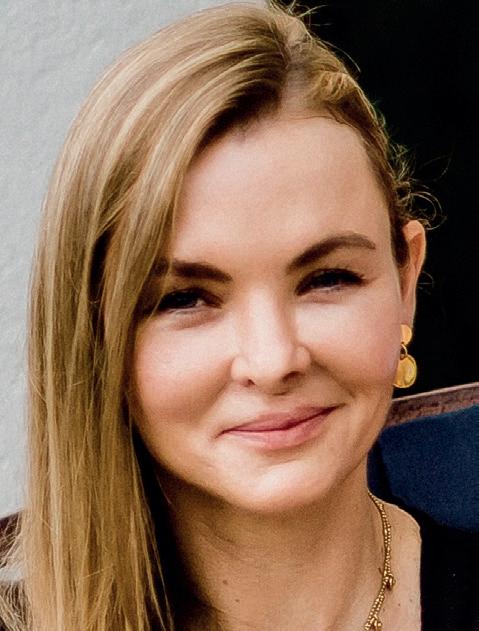
The City watchdog is proposing to toughen its “fit and proper persons” test to crack down on workplace misconduct in an effort to make the finance industry a safer work environment for women.
In a consultation paper published on September 25th, the Financial Conduct Authority (FCA) put forward stricter rules against abusers and regulated firms that may have failed to punish offenders.
The move follows a string of sexual harassment allegations in the City, which have included claims made against the hedge fund tycoon Crispin Odey.
Nikhil Rathi, Chief Executive of the FCA, told the Sunday Telegraph: “Financial services workplaces need to be safe places for women.”
Despite, or maybe because of, the relative lack of opportunities in many companies across the UK, combined with challenging economic times, research has revealed a “marked rise” in the number of women starting their own businesses. The research, carried out by Small Business Britain found that 39% of female entrepreneurs said that improving their work-life balance was the biggest catalyst for starting a business.
Meanwhile, 30% said they launched firms as they wanted to choose where they worked, and 25% reassessed their careers after having children.
More than 150,000 new companies were started by women in 2022 – more than twice as many as in 2018 – according to the latest Rose Review.


The Attorney General, The Rt Hon Victoria Prentis KC MP, has come under fire from the legal profession for ‘re-writing Contempt of Court legislation on the fly’. An ‘advisory’ dated September 22nd on the government’s own gov.uk website warned the media not to post anything which may prejudice the case against Russell Brand. This statement, according to leading KCs, has no basis in law as, at the time of writing, there was no active police investigation, nor had Mr Brand been arrested, which is when Contempt of Court rules kick in. The Times newspaper which, along with its Sunday sister paper and Channel 4’s ‘Dispatches’ programme, broke the story wrote, “The Attorney General’s censorious warning has no basis in law. She should withdraw it immediately.”
Behind every great man is a woman rolling her eyes
Jim Carrey
Female business owners and entrepreneurs are being urged to take part in a research project which will examine their impact on the regional and national economy.
The research, a collaboration between the University of York and the Federation of Small Businesses (FSB), will look at some of the barriers preventing female entrepreneurs from succeeding.

Findings from the project will be used to help shape the creation of supportive regional policy. The research seeks the views from all types of women in business, whether they are self-employed, freelancers, small businesses to larger businesses, female owned or female led and at any stage of their business journey.
Dr Anne-Marie Imafidon MBE has been announced as the winner for the global Entrepreneur of the Year Award.
The One Young World community for young leaders created the award, sponsored by TFG Asset Management, to identify and promote the world’s most innovative entrepreneurs.
Dr Imafidon is the co-founder of Stemettes, dedicated to inspiring and promoting young women and non-binary people in the Science, Technology, Engineering and Mathematical (STEM) sectors. Since its inception ten years ago, it has exposed 60,000 young people across Europe to her vision for a more diverse and balanced science and tech community.

She was awarded an MBE in the 2017 New Year’s Honours for services to young women and STEM sectors.

After her father’s sudden death in a car accident when she was a baby, Tessa Marshall, grew up with no memories of him. Drawing on her personal experience, she created ‘This Was Them’ as a new way to support children experiencing parental grief.
This Was Them gathers memories and stories from family, friends, and colleagues. These, along with photos, are curated into a beautiful hard back book which is then gifted to the bereaved child.
This valuable resource enables the grieving child to feel supported and connected, and gives them the opportunity to know mum, dad, or even grandparents better. The book is seen as a toolkit for children navigating grief. www.thiswasthem.co.uk
Whatever women do, they must do twice as well as men to be thought half as good. Luckily, this is not difficult
Charlotte Whitton
Women that believe in each other can survive anything. Women who believe in each other create armies that will win kingdoms and wars
Nikita Gill, Poet
Throughout history, black people have consistently led the charge in advocating for social justice, confronting oppression, and catalysing transformation. Nonetheless, despite their significant contributions to society, the remarkable accomplishments of black women, in particular, have frequently gone unnoticed or faded into obscurity.
This year, the theme of Black History Month is fittingly ‘Saluting our Sisters’, honouring and highlighting the pivotal role that black women have had in shaping history, igniting transformative shifts, and fostering communities.
Here we shine a spotlight on trailblazing black women who have left a significant mark in various fields, including business, entrepreneurship, academia, politics, civil services and beyond...
Black women have risen as prominent figures in the world of business and entrepreneurship. Their pursuits exemplify resilience, creativity, and an unwavering determination to challenge conventional standards. Acknowledging their accomplishments not only celebrates personal triumphs but also paves the way for upcoming generations. The pioneering women in this context have shattered boundaries, sparked transformation, and established an enduring heritage. To these exceptional women, we salute you.
Dr Kanya King CBE is a globally recognised entrepreneur and diversity advocate, known for founding MOBO and MOBOLISE. Since 1996, she has built MOBO into an international brand that champions diversity and talent from black and minority ethnic (BME) communities in music, culture, arts, fashion, and media. The MOBO Awards, under her leadership, has become a prestigious global event.
Kanya’s dedication to nurturing young talent led to the establishment of the MOBO Trust, offering training and educational opportunities. She also serves on influential boards and committees, representing the music and creative sectors. She has received MBE and CBE honours, the Music Week Strat Award (a special award for outstanding contribution to music) in 2021, and numerous honorary doctorates.
As the founder and CEO of MOBO, Kanya King has made it one of the most televised urban music awards shows worldwide, reaching over 400 million viewers across 200 countries since 1996.

❛❛ Follow your passion, not just the latest trends ❜❜
❛❛ The world needs more people who dare to take the unconventional path ❜❜
Izzy Obeng is dedicated to levelling the playing field for entrepreneurs from underrepresented backgrounds in the predominantly male and white tech industry. Izzy serves as the founder and director of Foundervine, an inclusive community that nurtures budding entrepreneurs. Through this startup accelerator, she offers early-stage companies mentorship, training, and financial assistance. Since its establishment in 2018, Foundervine has empowered over 300 entrepreneurs to launch their own businesses.
Her journey began at KPMG, the professional services firm, where she worked as a management consultant in the People & Change practice. In this role, she led transformative projects for some of the world’s largest brands, focusing on creating workplaces that prioritise the well-being of their employees. Today, she leads Foundervine and takes on an advisory role in entrepreneurship at the University of London, where she oversees an incubator programme, and manages grants for student-led businesses.
Vanessa Kingori OBE is a British businesswoman, diversity advocate and youth supporter with over 20 years of media industry experience. She currently serves as the Chief Business Officer at Conde Nast Britain, overseeing all ten CNB media brands, including Vogue and GQ. Vanessa made history as the first female business leader at British Vogue and British GQ, achieving remarkable success in revenue generation. She is a sought-after speaker on topics like digital transformation, change management, and business purpose, especially for FTSE 100 companies.

She is a prominent youth advocate, serving as a Governor and Trustee on University of the Arts London (UAL’s) Board of Directors and holding a Visiting Fellow role at the UAL, where she mentors students across its six colleges. She also contributes to key organisational decisions. Vanessa received honorary accolades from both UAL and Royal Holloway.
As a diversity advocate, she judges the Black British Business Awards and the Veuve Clicquot Business Women of The Year Award. She is a member of The Royal College of Obstetricians and Gynaecologists Race Equality Taskforce. Vanessa supports women entrepreneurs through her involvement in Peanut StartHer, a micro fund focused on assisting pre-seed startups in tech and business, especially those founded by women with a purpose-driven mission.

VANESSA KINGORI MBE CHIEF BUSINESS OFFICER, CONDE NAST
❛❛ Success is not about who you are, but what you become ❜❜IZZY OBENG FOUNDER, FOUNDERVINE
Over the course of history, women have encountered many obstacles while striving to lead, and black women have faced further obstacles complicated by the burden of racial prejudice. Nevertheless, black women have consistently transcended these challenges, leaving their indelible marks on the pages of history. We salute you.
After a successful career as a barrister, Dame Linda Dobbs DBE made history in October 2004 by becoming the UK’s first non-white High Court judge. She had previously served as a Deputy High Court Judge starting in 2003. In her barrister career, she actively participated in various committees, including those related to race relations, equal opportunities, international matters, professional conduct, and professional standards. In 2003, she became the Chairman of the Criminal Bar Association, where she established its first Equality and Diversity sub-committee.
During her tenure on the High Court Bench, Dame Linda held significant roles, including Senior Liaison Judge for Diversity, Chair of the Magisterial Committee of the Judicial Studies Board, Chair of the International Committee of the Judicial College, and a Fawcett Commissioner.
Dame Linda Dobbs has been recognised as one of Britain’s most influential Black women and has also been named among the 100 Great Black Britons. In 2013, she left her High Court Bench position early to pursue various interests, including the international training of judges and lawyers, with a specific focus on the Caribbean and Africa.

HIGH COURT JUDGE, RETIRED
❛❛ Justice should be colour-blind, but that doesn’t mean we should be blind to the importance of diversity on the bench ❜❜
❛❛ Racism is a disease. And we have to work together to find a cure ❜❜
Doreen Lawrence OBE is the mother of Stephen Lawrence, the British teenager who was murdered in a racist attack in 1993. In the aftermath of the McPherson Inquiry into the killing, she continued to campaign for justice for her son, as well as other victims of racist crime. She has worked to secure further reforms of the police service, and in 2003 was appointed OBE for services to community relations.
Baroness Lawrence of Clarendon is the founder of the Stephen Lawrence Charitable Trust, which promotes a positive community legacy in her son’s name. She has been selected to sit on panels at the Home Office and the Police Service and is a member of both the board and the council of Liberty, the human rights organisation, as well as being a patron of hate crime charity Stop Hate UK.
Her work has led her to receive a number of achievements like the Lifetime Achievement Award at the 14th Pride of Britain Awards. She also served on the Joint Committee on Human Rights in Parliament.

❛❛ We need more leaders who will stand up for justice, fairness, and human rights ❜❜
Baroness Amos began working in local government in London and led the Equal Opportunities Commission from 1989-94. In August 1997, the Labour Party government under Tony Blair appointed her a life peer. Within the House of Lords, Amos took on roles as the government spokesperson for social security, international development, women’s issues, and foreign and Commonwealth affairs.
In May 2003, she became the first Black woman to join the British cabinet when she was appointed as the International Development Secretary. Amos assumed the position of Leader of the House of Lords, which she held until 2007.
Subsequently, she served as the British High Commissioner to Australia from 2009-10 and as the head of the UN Office for the Coordination of Humanitarian Affairs from 2010-15. In 2015, she took on the role of director at the SOAS at the University of London. She departed in 2020 to become the first woman and the first Black person to lead a college at the University of Oxford.

These women harness the potency of their words and the force of their unwavering beliefs to drive change. Their messages resonate well beyond mere speeches, breaking down obstacles and paving the path for progress. Through their courage and conviction, they prove that even just one voice can ignite a movement.
Yvette Williams MBE has over three decades of experience in driving cultural and organisational change, promoting equality and diversity, and crafting public and community engagement strategies. She’s been actively involved with various organisations, including the Mangrove Community Association, Tabernacle Community Centre, and Pepper Pot Club.
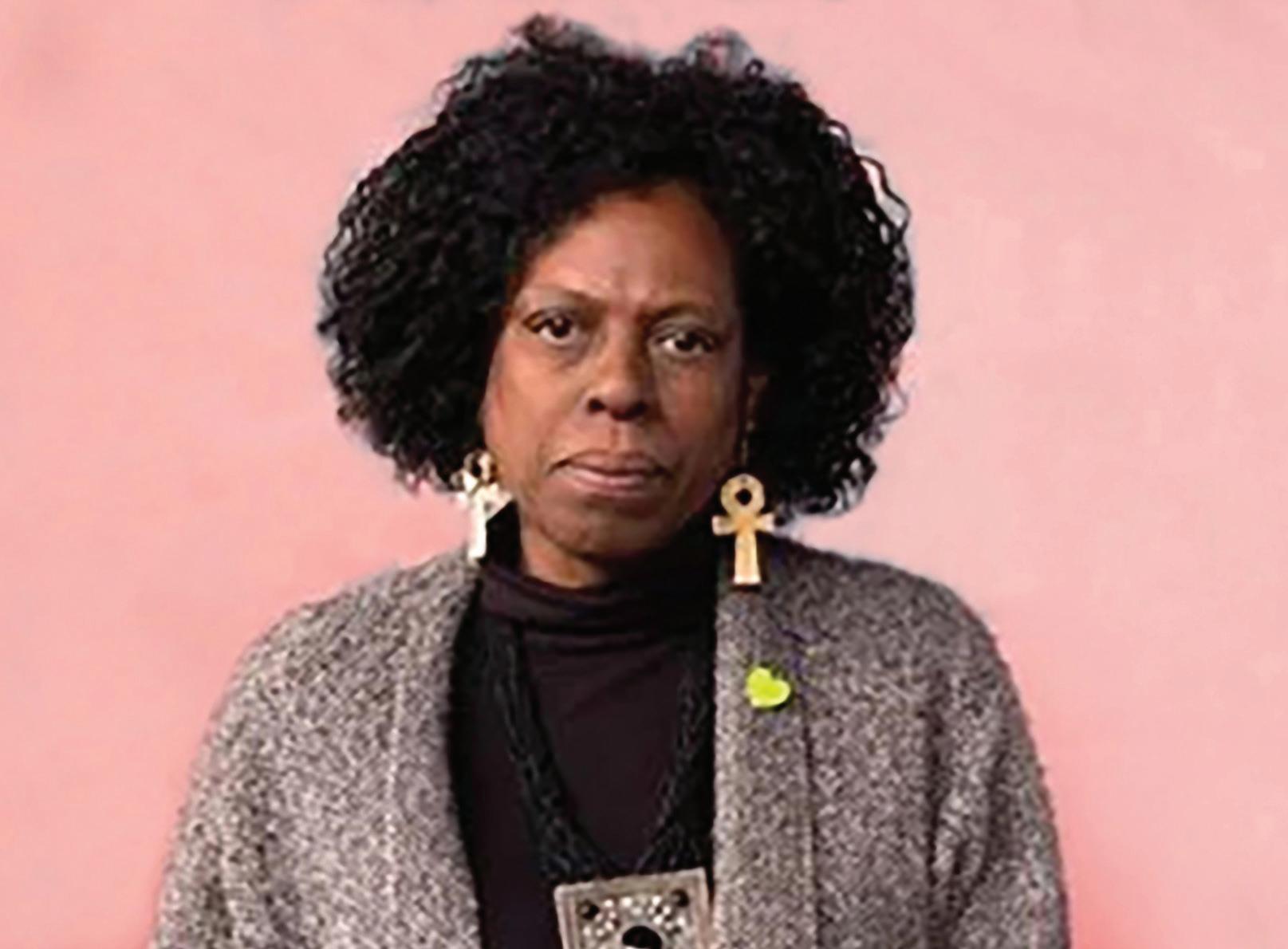
She co-founded Operation Black Vote and served as the head of Equality and Diversity for the Crown Prosecution Service in London for 14 years, focusing on prosecuting hate crimes and community engagement.
In 2012, Yvette received an MBE for her exceptional contributions. She co-founded the Justice 4 Grenfell Campaign, raising awareness of the Grenfell Tower disaster. Yvette has been a prominent speaker at events like the Women of the World festival, GMB union conference’s Justice Lecture, and TEDx London.
The Justice 4 Grenfell team received the Significant Contribution Award in 2019 and the Education Category Award in 2020 at the New York Film Festival for their impactful film, “Grenfell and Social Murder.”
Her written contributions have appeared in various publications, and she graced the cover of British Vogue in September 2020 as one of 20 international activists. She was also recognised in the UK Ethnicity Awards Top 100 list for her unwavering commitment to positive change and justice advocacy.
❛❛ The truth will always fi nd its voice ❜❜
❛❛ The history of Black women in Britain is a testimony to our ability to survive, adapt and grow in the face of adversity ❜❜
Stella Dadzie is famous for ‘The Heart of the Race: Black Women’s lives in Britain,’ which earned her the 1985 Martin Luther King Award for Literature. This book was reissued by Verso in 2018 and is now considered a seminal feminist classic. In October 2020, she released her latest book, ‘A Kick in the Belly: Women, Slavery & Resistance,’ published by Verso, and it received widespread critical acclaim.

Stella is also a founding member of OWAAD (Organisation of Women of African and Asian Descent), a national collective that emerged in the late 1970s during the British Civil Rights movement, primarily advocating for the rights of Black women. Recently, she has been recognised as one of the influential figures in Black Feminism in the UK, often referred to as one of its “grandmothers.” Her personal archive, housed in the Black Cultural Archives in Brixton, is a frequent destination for researchers and scholars. Throughout her 40-year career, Stella has made significant contributions as a writer, artist, and education activist. She has authored numerous publications and resources aimed at promoting effective practices for Black learners and other minority groups. Her work also extends to efforts to decolonise and diversify the national curriculum in schools and colleges across the UK.
❛❛ Being British is not a matter of straightforward lineage, but a complex interweaving of histories, cultures and choices ❜❜
Afua Hirsch has over 20 years’ experience in journalism, having started her career at the age of 14 with The Voice, Britain’s oldest Black national newspaper. Subsequently, she engaged in international development work across 15 countries in Africa. Later, she pursued a career as a barrister, specialising in media law, international justice, and human rights.
Over ten years, Hirsch has written for the Guardian newspaper. She began as a legal correspondent, later becoming a foreign correspondent, where she established the paper’s first-ever West Africa bureau. She also frequently contributes to publications such as the New York Times, Time Magazine and Vogue.
Hirsch’s diverse career also includes serving as the social affairs editor and anchor at Sky News. She has also been involved in multiple projects, including reporting via international media outlets.
In 2018, she authored her debut book, ‘Brit(ish): Getting Under the Skin of Britain’s Race Problem’. The book achieved bestseller status and received the Royal Society of Literature Jerwood Award.

Whichever way you view her political activism, it’s not unreasonable to say she is a continuation of Italy’s overt flirtation with the far-right… Certainly, you’d be hard pushed to call her social attitudes ‘liberal’

For many reasons, immigrants from Africa and the Middle East come to Europe via unorthodox routes. The first port of call into Europe is usually either Greece or Italy.
There are now thousands of migrants to deal with when they reach Lampedusa – an island in the Mediterranean, closer to Tunisia than to mainland Italy. However, as being part of the Italian nation, it is that country that needs to deal with the migrants.
Countries in the EU, with their international obligation to help immigrants, whether by housing them, granting them asylum or repatriating them as appropriate, need to step up in order to help their fellow nations. This should not be Greece’s nor Italy’s problems alone.
New far-right Italian Prime Minister Giorgia Meloni has promised a populist solution to the crisis. So who is Europe’s newest female leader? And what are her chances of success on the question of immigration?

Giorgia Meloni has been serving as the prime minister of Italy since October 22nd 2022, the fi rst woman to hold this position. A member of the Chamber of Deputies since 2006, she has led the Brothers of Italy (FdI) political party since 2014, and she has been the president of the European Conservatives and Reformists Party since 2020.
Such is her rise in Italian politics that, in 2022, Meloni was listed seventh on Forbes magazine’s list of ‘Most Powerful Women in the World’.

Giorgia Meloni was born in Rome on January 15th 1977. Her father Francesco was from Rome, and her mother Anna is from Sicily. Her father was a tax advisor and often voted for the Italian Communist Party while her mother later became a novelist.
Her father left the family when she was a year old in 1978. Giorgia herself has four step-siblings from her father’s second marriage. She was raised in the working-class district of Garbatella in Rome, moving there after the more affluent home she had fi rst lived in as an infant with her parents was destroyed in a house fi re a few years after her father left. Her upbringing has been described by her family as ‘impoverished’. In her autobiography, Meloni wrote that her childhood and family’s breakdown was an influence on her political outlook.
RIGHT: Meloni, on her appointment as Italian Minister of Youth, 2008
BELOW: Meloni with Silvio Berlusconi, and Matteo Salvini, attend a centreright coalition rally, 2018


In 1992, aged 15, Meloni joined the Youth Front, the youth wing of the Italian Social Movement (MSI), a neo-fascist political party that ultimately dissolved in 1995. During this time, she founded the student coordination Gli Antenati (The Ancestors), which took part in the protest against the public education reform promoted by minister Rosa Russo Iervolino.
In 1996, she became the national leader of Student Action, the student movement of the post-fascist National Alliance (AN), the national-conservative heir of the MSI, representing this movement in the Student Associations Forum established by the Italian Ministry of Education.
In the 2006 Italian general election, she was elected to the Chamber of Deputies (the Italian equivalent of the House of Commons) as a member of the National Alliance (AN), where she became its youngest ever vice-president.

In the same year, she started to work as a journalist, even though her professional qualifications on this matter are of huge debate. She graduated from an institution that wasn’t itself qualified to issue diplomas.
Meloni defended the laws passed by the third Berlusconi government that benefited companies of the prime minister and media mogul Silvio Berlusconi and also delayed ongoing trials involving him. Meloni stated “it is necessary to contextualise them. Those are laws that Silvio Berlusconi made for himself. But they are perfectly fair laws.”
In her autobiography, Meloni wrote that her childhood and family’s breakdown was an influence on her political outlook
Berlusconi’s ultimate conviction for fraud in 2013 give these words a certain hollow ring. However, given Italian culture and attitude towards a politician creating laws that benefit themselves or their friends, upon his release from prison, he was duly elected an MEP in the 2019 European elections.
In 2008, aged 31, Meloni was appointed Italian Minister of Youth in the fourth Berlusconi government, a position she held until November 2011, when Berlusconi was forced to resign as the prime minister amid a fi nancial crisis and public protests. She was the second youngest-ever minister in the history of united Italy (a unification which been completed in 1871).
In Italy, where political parties are formed and disbanded with the casual abandonment of a stag or hen do, Meloni’s party merged with Forza Italia (FI) into The People of Freedom (PdL) and she took over the presidency of the united party’s youth section, called Young Italy.
In November 2010, on behalf of the ministry, she presented a €300m package called the Right to the Future. It was aimed at investing in young people and contained five initiatives, including incentives for new entrepreneurs, bonuses in favour of temporary workers (effectively, ‘zero hour contracts’), and loans for deserving students.

In November 2012, she announced her bid to contest the PdL leadership against Angelino Alfano, in opposition to the party’s support of the Mario Monti government. She teamed up with fellow politicians Ignazio La Russa
and Guido Crosetto to set out an anti-Monti policy, asking for renewal within the party and being also critical of the leadership of Berlusconi.
The following month, Meloni, La Russa, and Crosetto founded a new political movement, Brothers of Italy (FdI), whose name comes from the words of the Italian national anthem. In the 2013 Italian general election, she stood as part of Berlusconi’s centre-right coalition and received 2.0% of the vote and nine seats.
In the intervening years until her rise to prime minister, she has declared herself as being opposed to LGBT rights, abortion, euthanasia, celebrated far-right politicians (including supporting the naming of a street in Rome after a prominent neo-fascist Giorgio Almirante) and she has also declared that there is no such thing as homophobia in Italy.
Whichever way you view her political activism, it’s not unreasonable to say she is a continuation (rather than renaissance, as it has never really gone away) of Italy’s overt fl irtation with the far-right – something she denies –which carried the ideology to power, and then oblivion, in the early 20th Century. Certainly, you’d be hard pushed to call her social attitudes ‘liberal’.

She has declared herself as being opposed to LGBT rights, abortion, euthanasia, and declared that there is no such thing as homophobia in ItalyMeloni talks to the press about prime minister Giuseppe Conti’s management of Covid-19, 2020
In a country whose governments function on coalitions (unlike the UK which still largely operates a duopoly in its Parliament), Italy’s 2022 General Election was once again fought with coalitions and agreements among the various political parties and groups.
As of July 2022, FdI was the first party in the coalition according to opinion polling, and Meloni was widely expected to become Prime Minister of Italy if the centre-right coalition obtained an absolute majority in Parliament. It would be considered the most right-wing government in the history of the Italian Republic according to some academics.
Italy itself has been described as a ‘flawed democracy’ by the Economic Intelligence Unit. Meloni’s government is the 75th since the fall of Mussolini, averaging just over 400 days per administration. (The UK, by comparison, is on its 31st government in that time).

In an attempt to moderate herself to placate fears among those who describe FdI as neo-fascist or far right, including fears within the European Commission that she could lead Italy towards Hungary’s political stance under Viktor Orbán, Meloni told the foreign press that Italian fascism is ‘history’.

Italy itself has been described as a ‘flawed democracy’…
Meloni’s government is the 75th since the fall of MussoliniMeloni accepting the task of forming a new government, 2022
Her main campaigning issue was the subject closely associated with the fears of the right - immigration. She called for a zero-tolerance policy, and wants to blockade migrants from reaching Italian ports, while boosting the birth rate of Italian nationals to ease the need for migrant labour. She is also opposed to birthright citizenship proposals, which would give citizenship, including education rights, to foreigners born and living in Italy.
These policies may well be popular with certain sections of Italian society, who are opposed to the concept of immigration for its own sake. However, scratch the surface of these policies, and one can see how quickly they’d fall apart.

If nothing else, Meloni has the advantage of looking across the continent to see how these policies play out, and all the evidence suggests they are almost certainly doomed to failure.
For a start, it requires the connivance of native Italians who may not support this birth policy. The military in Italy, especially the Navy, like many of its counterparts across the western world, is often loathe to get involved with civilian issues like this.
She has linked ‘illegal immigration’ and crime, and refugee arrivals to human trafficking and prostitution – again, a common theme across Europe’s right-wing politicians, and again, without primary evidence.
Meloni tried to make a deal with Tunisian President Kais Saied, with a focus on stopping illegal migration from Tunisia to Europe. Instead, last month, more than 120 boats carrying around 7,000 migrants from Africa arrived on the Italian island of Lampedusa within 24 hours. The local migration centre couldn’t cope, and very soon, over 11,000 migrants had arrived on an island which has only 6,000 inhabitants.
For their part, the residents of Lampedusa were largely sympathetic – for now – to the migrants’ plight; they more expressed a concern about their island becoming a ‘tent city’.

In September this year, Giorgia Meloni invited Ursula Von Der Leyen, President of the European Commission, to Lampedusa to see for herself the unfolding problems on the island. Following that visit, Von Der Leyen issued a ten-point action plan to help Italy, the residents of Lampedusa, closer co-operation with Tunisia, support for those who qualify for asylum, a step up in the fight against the people smugglers who are preying on the vulnerable, and a wider-European solution.
She finished her statement with, “Migration is a European challenge that requires a European answer and solution. It is concrete actions that will bring change on the ground. It is only through solidarity and unity that we can achieve this. And you can count on the European Union.”
What the statement did not mention was support for any of Meloni’s policies of zero tolerance or blockades. The Italian government, on the back of Von Der Leyen’s proposals, may well alter course on its route to dealing with a massive migration problem. However, whatever path it does tread, what is evident is that Meloni’s immigration policies, certainly if she wishes to get help from other European nations, have fallen at the first hurdle.
Meloni’s immigration policies, certainly if she wishes to get help from other European nations, have fallen at the first hurdleLEFT: Lampedusa. African migrants are rescued by Italian authorities, 2023


















INNOVATOR OF THE YEAR
BUSINESS GROWTH AWARD


EMPLOYER OF THE YEAR
BUSINESSWOMAN OF THE YEAR
CEO OF THE YEAR
INSPIRATIONAL AWARD
LARGE BUSINESS OF THE YEAR

MEDIUM BUSINESS OF THE YEAR
SUSTAINABILITY CHAMPION







BEST NEW BUSINESS

LIFETIME ACHIEVEMENT AWARD
COMMUNITY HERO AWARD
PROFESSIONAL SERVICES AWARD
YOUNG PROFESSIONAL OF THE YEAR
PROPERTY PROFESSIONAL OF THE YEAR
COMPANY OF THE YEAR

 SPONSORED BY
SPONSORED BY
Projects to revive England’s endangered wildlife species have been awarded £4.5 million of funding by Natural England. 63 projects across the country will receive their share of the grant to help recover 150 species nationwide. From Duke of Burgundy butterflies to North Yorkshire’s Native Crayfish, many species will benefit from the money going towards breeding programmes and restoring habitats.

Neurodivergent individuals often have a harder time finding jobs than their non-neurodivergent counterparts. But this population may have specialised skill sets that makes them better suited for certain roles. Research shows that neurodivergent people can make teams up to 30% more productive when placed in the right environments. Now Mentra, a North Carolina–based startup, is building an AI-powered “neuro-inclusive employment network.” Its tech platform leverages AI to help companies hire employees with cognitive differences such as autism, ADHD, dyslexia, OCD, and PTSD. Since its launch, Mentra has partnered with over 30 universities and more than 200 service providers across the US. Its talent pool has grown from 300 neurodivergent job seekers in March 2022 to over 33,000 today.
Hundreds of communities around the US will share more than $1 billion in federal money to help them plant and maintain trees under a federal programme that is intended to reduce extreme heat, benefit health, and improve access to nature. The US Department of Agriculture announced the $1.13 billion in funding for 385 pre-approved projects.

Rechargeable batteries may seem like a good thing from an environmental point of view, especially compared with disposable ones. However, they’re actually full of heavy metals and have an environmental impact when they reach the end of their lives. Battery developers have long sought an alternative, and now carbon dioxide consumer batteries have been produced which are good for up to 500 recharges. A team at the University of Illinois in Chicago has come up with carbon-neutral batteries that may mean portable electrical products become greener than ever before to use.

❛
❛
I am thankful for my struggle because, without it, I wouldn’t have stumbled across my strength
Alex Elle
UK ministers are considering a change in law aimed at ensuring individuals have the right to seek a second medical opinion. This has been spurred by the advocacy efforts of parents who lost their teenager to sepsis.
Known as “Martha’s Rule,” this proposed law, named in honour of 13 year-old Martha Mills, is intended to simplify the process for patients and caregivers to question the decisions of healthcare professionals. Martha succumbed to sepsis in 2021 at King’s College Hospital, London, following a bicycle accident.
A report later stated her chances of survival would have been good if she had gone into ICU earlier, while her family’s concerns were ignored.
The plans have received support from across the medical profession.

A novel technology has been demonstrated in the US which allows blind people to gain more visual perception. A research team from UCLA Health has used surgical implants in four blind patients to allow them to perceive light and dark. A wireless device ‘looks’ at objects which then sends signals to the implant. The brain is then able to perceive the implant’s stimulation as patches of light and dark. In some cases, blind people have been able to sense individual objects and even movement.

The UK government has published solar panel deployment statistics which show a total of 15.2GW of solar capacity, an increase of 6.7% in the year since June 2022.
The yearly increase is the highest seen since September 2017, and there are now a total of 1.35m solar installations in the UK.
The government report records 18,808 installations in June 2023, amounting to 84MW of solar capacity. This was the highest monthly figure since March 2023, and is much higher than average figures for 2016-21.
From 2016-21 the median number of solar installations a month was around 3,000, but in the past year the figure has been over 15,000 a month. Meanwhile, solar energy experts believe that the data only covers subsidised installations. Unsubsidised projects are not included in government figures.

Climate change is a looming threat, but our anxious feelings around it may actually have an underlying positive purpose. A University of Bath study suggests that climate anxiety may actually serve as motivation to take action. According to the research, people in the UK who experienced climate anxiety were more likely to engage in behaviours that reduce their carbon footprint, including buying second-hand items and repurposing items, saving energy, and cutting down on meat consumption.



’MARTHA’S RULE’ COULD
❛ ❛ In a world that wants women to whisper, I choose to yell
Luvvie Ajayi
NEW
❛ ❛
We need to get women to the point where they aren’t apologising. It’s time to take ownership in our success
Tory Burch
In our exclusive Spotlight feature, we highlight women who are doing good things in their community. They’re not always seen but we think they should be.
Senior Solicitor & Collaborative Lawyer, Gilva Tisshaw founded Tisshaws Family Law Solicitors in 2012. She was the winner of the Lawyer of the Year Award at the Dynamic Business Awards 2023. Here is her story…
Gilva first qualified as a solicitor in 1989. Today, 34 years on, she is the most experienced family law solicitor working in Mid-Sussex. Having built a successful legal career over the following decade after qualifying, she was a founding partner of Hamnett Osborne Tisshaw, before establishing her own family law firm in 2012.

“My motive for setting up Tisshaws was to create a culture of care for both clients and staff, in a specialist firm,” explains Gilva. “People are at their most vulnerable when dealing with a family breakdown. The most important aspect of the work, for me, is that they feel they are represented by someone who genuinely cares and who can guide them appropriately.”
This ethos is at the heart of the firm’s DNA, and Gilva is proud to have built a team of likeminded colleagues, who enjoy supportive office relationships, alongside flexible working arrangements.
“We offer a range of resolution services including mediation, collaborative practice and arbitration. This saves clients the cost and stress of going to court, and instead have a meeting room which can be set up as a courtroom for arbitration and video link hearings. This range of services puts us on par with larger London firms, but with more competitive rates,” she reveals.
A strong believer in justice for all, Gilva has initiated business policies designed to help the most diverse and inclusive range of clients possible, as well as supporting those traditionally underrepresented in the legal world. These efforts have not gone unnoticed, and Gilva and the team were proud winners of the British Chamber of Commerce Trailblazing Equality Award 2022, for both Sussex and the entire Southeast regions.
“Looking to the future, we hope to consolidate and build on our success by prioritising client service and staff welfare, alongside helping to increase diversity within the profession.”
www.tisshawssolicitors.co.uk
A strong believer in justice for all, Gilva has initiated business policies designed to help the most diverse and inclusive range of clients possible
I certainly never dreamt I would be owner of an estate agent; I always wanted to be a lawyer. There was something about righting wrongs that spoke to me from a young age and when I ‘fell’ into this industry as a teenager, I soon realised that working in the property sector would involve promoting a level of integrity not often seen.
I started as a receptionist for a Housing Association and quickly found that having empathy and a listening ear was vital. I learned quickly that caring about the people you are dealing with will always stand you in good stead. I moved into Property Lettings for independent and corporate agencies alike, and I excelled in my career before I relocated to Sussex from Hampshire in 2010.
From the beginning, I was always told that my business model was too ‘fluff y’ to be successful, mainly because I didn’t want to focus my team on hitting financial targets and getting their commission over client satisfaction. I was told clearly that estate agents are ‘commission first, service second’, and this was the opposite of my plans.
I have two businesses, Lawton & Dawe Properties which turns 13 years-old in October, and Property Fusion which hits its tenth anniversary in the same month. I have a team of ten valued staff who know I respect them and their work for me. They, in turn, respect me to carry on our ethos ‘be better; do better’.

The company I started was in a location where I had no contacts and no existing relationships to rely on. Therefore, everything that we have now has been generated by my belief that an estate agent who prioritised kindness and empathy has a space in this market. We still network rather than advertise to grow our business. If you know what
I do, like what I do, and trust me in what I do, those referrals are priceless.
One of the main challenges I have faced is that still some people view a female estate agent with a lack of respect. Only 13% of all estate agents are owned by women –13%! I feel that this statistic is incredibly disheartening, and only when the talents of female estate agents and the attributes that they can bring are fully valued and appreciated will this ever change. I know I will always push my daughters to not settle for anything less than what they want, regardless of traditional gender expectations.

I want to continue to show that there is nothing ‘fluff y’ about caring; that teamed with an unmatchable work ethic and a genuine heart this can get you to anywhere you want to be. If that is a mother of two, wife, daughter, friend, CEO and Founder of two companies, then you can be all that – and more.
www.lawtonanddawe.co.uk #knownolimits
One of the main challenges I have faced is that still some people view a female estate agent with a lack of respect
Chrissie is the Founder and Editor at Changemaker® Media, a social impact business based in Kent

Starting a new business is like writing a first novel - the temptation is to throw all of your ideas into the plot.
I have several goals for Changemaker Media and Marketplace. First up, to mentor contributors who want to write about the environment and nature. Secondly, to feature charities, social enterprises and individuals supporting the planet and thirdly (take a breath), to sell and promote eco products. All of this on my own and unpaid. Unrealistic, I know.

Our first two contributors secured amazing roles. Olivia, a graduate who covered politically-led news, landed an amazing job lobbying MPs in Westminster. Ali, graduate photographer, joined a fashion company that needed to become more sustainable.
As a magazine editor who grew up on Cosmopolitan, Marie Claire and Hello!, I feel blessed to have the opportunity to share my experience with aspiring writers.
I have also been a founding director at The Design Gallery for 21 years, which aligns with this new venture.
How do I turn this service into a self-fi nancing business?
Enter Dynamic Magazine and the University of Brighton’s School of Business and Law
Happy days. Yet the big question remained - how do I turn this service into a self-financing business? Enter Dynamic Magazine and the University of Brighton’s School of Business and Law. I completed the intensive Help to Grow “MBA”, and now have a network of inspirational colleagues and entrepreneurial expertise.
Have I learned how to manage the constant stream of ideas? In a way, yes. I get into my metaphorical helicopter and take an overview for a few hours every week, and I remember that I’m doing this because I want to support others - and that others support me.
Thank you to Dynamic Magazine, my mentor David Lynn CDT, Pam Gordon of The Franchising Centre and to my contributors and to everyone working in sustainability –we can’t do it without you.
www.changemaker.media
Instagram: @changemaker.marketplace
E: chrissie@changemaker.media
Sophie Lee is the founder and director of Electric Peach, a brand storytelling and impact agency for purpose-led businesses and B Corps. Here, she tells us her story…

In 2017, the seams of my life finally burst open. The day had been coming for some time. My life was in a bad space and, although I was the head of the content and PR department at a Brighton-based creative agency, I was utterly miserable. Life looked great but felt like an empty void.
Then, the toxic relationship I found myself in ended, and I was left with my share of the flat sale and the opportunity to take a deep, painful look in the mirror. As fate would have it, I met Alice Reeves just a few months later. We bonded over a shared disdain for the industry we both worked tirelessly for.
It was agreed. Marketing needed a makeover.
The Joyful was born in September 2017 with an audacious vision: to transform marketing from a manipulation machine into a force for good, a way to electrify audiences with impossible-to-ignore stories that unite communities around a shared vision, and galvanise them to action.
Earlier this year, Alice lovingly left to start Joyfully Different, a community for neurodiverse entrepreneurs. We rebranded to become Electric Peach, at the same time as becoming an accredited B Corp with a score of 107.

Electric Peach works with organisations such as CIEEM, the United Nations, and nationwide colleges and universities, as well as impact-driven, global brands. We donate over 20% of our profits to aligned organisations, and are on track to becoming employee-owned.
I am also a non-executive director at the Organisation for Responsible Business, a trustee for Recovery Connections, a lived experience recovery charity, and a business mentor for Enterprise Nation. I’m passionate about the importance of responsible business practice and the power of brand storytelling to shift the narrative and drive real social change and impact.
www.electricpeach.co.uk

The Joyful was born in September 2017 with an audacious vision: to transform marketing from a manipulation machine into a force for good
While mental health often takes the spotlight, it’s important we continue to open up the conversation on the less talked about aspects of our health; like menopause awareness. Since 2009, the IMS (International Menopause Society) alongside the World Health Organisation (WHO) designate October as World Menopause Awareness Month
The Cambridge Dictionary definition of the menopause is very succinct. In fact, some might say this is an unfortunately scant description of a major life event that affects all women who reach later life. That the definition is so brief could be seen as a reflection of the fact that the social impact of menopause has for years been taboo or dismissed entirely in our society - especially in the world of work.
Yet the menopause is a complex event which can display many different facets depending on the individual and their environment. This, combined with a stigma which has lasted for generations, makes it a difficult topic to discuss both formally and informally. In recent years there has been growing awareness of menopause.

Increasingly, women are being encouraged to open up about issues and discuss the changes and effects which happen to them. Many businesses – with the help of expert consultants – are rolling out menopause policies, and working to create a culture that promotes openness when it comes to menopause.
Common symptoms of the menopause can include hot flushes, mood swings, loss of sex drive, fatigue and ‘brain fog’. These are symptoms which can have an impact on your daily life but are not always talked about.
A 2022 Government inquiry by the Women and Equalities Committee examined the extent of discrimination faced by menopausal people in the workplace, and investigated how Government policy and workplace practices can better support those experiencing menopause.
The result of this inquiry was a range of recommendations. These include appointing a Menopause Ambassador, and introducing menopause leave. On January 24th 2023, MPs rejected these recommendations, and also dismissed a further recommendation to include menopause as a protected characteristic under the Equality Act.
Against this backdrop, we wanted to investigate the view of workers - both male and female - of the menopause at work. It’s a phase of life which affects 51% of the population. And with women over 50 representing the fastest growing segment of the workforce, it is crucial that businesses and organisations work to retain this talent.
‘Older women,’ as a defined group, can be an untapped resource of knowledge and experience. In many cultures, menopausal women are seen as the wise and experienced people to turn to for guidance and support.
We believe there is an opportunity here, for businesses to actively seek out women who are going through this life stage. Our report uses quantitative research of UK workers mixed with expert commentary to examine this issue, and suggest solutions, tactics and methods to help create menopausefriendly work cultures for everyone.
Our society sexualises women when they are still girls and discards them at their most powerful. With an ageing population, poor female representation at board level, and a gaping hole in the workforce, this is as financially ludicrous as it is sexist and ageist
Claire Lowson, Founder of Supermenopausethe time in a woman’s life when she gradually stops having periods
The DAPS Agency, PR, marketing and communications agency that states it ‘thrives on a challenge’, along with Prospectus Global, an independent, international research and insights agency, published a paper on their findings having spoken to men and women of all ages on society’s view on the menopause.

Some of their findings make for some eyebrow bungee-jumping…
• On a fundamental level, 19% of people (a quarter of men and 12% of women) admit that they have no knowledge at all about menopause.
• 21% of men, and one in 10 women even have no idea when women might start menopause.
• One in five of all 18-to-24-year-olds are unaware of what the symptoms of menopause might be.
• 61% of women over 45 agree that “menopausal” is often used in an insulting or pejorative manner.
• 49% of women aged 45 and over would not feel comfortable talking to a line manager about menopausal symptoms.
The study found that only 37% of managers have been offered training around menopause. This results in some unacceptable responses from bosses. When these managers were confronted with people who told them they were suffering menopause symptoms -

• 27% admitted they were shocked
• 25% didn’t know what to do
• 16% thought they were being lied to
• 9% thought the complainant was making a fuss about nothing
• 8% ignored them.
In all 47% of women did not feel supported during their menopause.
While women have some protection for their menopause from the Equalities Act 2010, which means that discrimination on grounds of sex, disability or age is illegal, making menopause a protected characteristic, alongside others such as pregnancy, would be a big step forward.
Menopause is not an illness, it’s a natural phase of a woman’s life
Pat Duckworth Founder of Smarter Menopause
Speaking up about the menopause often does not come easily for many women; as a result, many will suffer in silence. There are ways to increase menopause awareness at work and celebrate World Menopause Awareness Day at the same time.
Champion Health in London has created a whole range of helpful guidance notices for women to raise menopause issues, and for individuals and organisations to treat them appropriately.

Your fi rst challenge in raising menopause awareness is to tackle the stigma surrounding it. Do this by turning the menopause into a normal topic of conversation.
Th is means helping others to understand what happens during the menopause. Increasing this level of understanding isn’t just helpful for other women, it’s key for all of us because it gives us the skills we need to support our colleagues, friends and family. Several organisations provide menopause training within the workplace, like Menopause in the Workplace.
Looking to create your own training? The Faculty of Occupational Medicine has published guidance on menopause in the workplace, which you should utilise. It can also be hugely impactful to invite staff members to share their own experiences of the menopause – if they are comfortable doing so.
You may also want to consider creating an informal support group, giving your employees a safe space where they can discuss their experience and offer peer support.
Women often avoid talking about the menopause at work because they’re afraid it will jeopardise their job. That means one of your challenges in raising menopause awareness is to tackle the stigma surrounding it. Do this by turning the menopause into a normal topic of conversation – don’t be afraid to talk about it openly in meetings and emails.
The best organisations will also introduce awareness sessions and train line managers on how to have the right conversations and offer the best support.
Th is also means reaffi rming your zero-tolerance policy on discrimination – which includes the menopause.
❛❛It is essential to create safe spaces for open dialogue among women, while also ensuring the availability of trained individuals who can offer support and find solutions
Emma
Freivogel, Founder, Radical RecruitIt may feel daunting to take in so much information about the menopause, especially when you want to present this to your organisation. Luckily, there are some fantastic resources out there just waiting to be shared with your organisation – including:
• For everyone: Managing the Menopause at Work PDF Guide
• For organisations: Menopause in the Workplace: What Organisations Can Do
• For professionals: How to work through the menopause
We also highly recommend CIPD’s Line Manager Guide to the Menopause, which you can download at www.cipd.org/uk/topics/menopause
• www.imsociety.org/education/world-menopause-day
• https://perspectusglobal.com/wp-content/uploads/ 2023/09/Perspectus-x-DAPS-Menopause-Report-2023.pdf
If you can, use this information to raise menopause awareness in your organisation. By helping to break down this damaging stigma, you’ll help to improve the lives of women across the world.
https://championhealth.co.uk
https://perspectusglobal.com
https://dapsagency.com

If we are serious about making a difference to those who are going through menopause, we have to accept that there is no one menopause. Each woman experiences her menopause with her own individual challenges
Dr Rachel Taylor, Neuroscientist
• Personal finance advice
• Retirement planning
• Business support







• Generational planning
• Tax year-end advice






I’m proud to represent both male and female clients. And, while it goes without saying that both can experience the same stressors, there’s no avoiding the fact that women face several unique challenges.


My 20 years’ experience has shown that women can therefore greatly benefit from highly personalised financial advice, which takes these challenges into account. This is why I’m so passionate about empowering women with the confidence and tools to help them achieve their long-term financial goals.

So, whatever your financial journey so far, let me give you the guidance, support, and stability to help you plan a happy and financially secure life.

The topic of bone health isn’t given anywhere near as much airtime as weight gain, hot flushes, mood changes and sleep issues, yet it’s really incredibly important to pay attention to, writes
TANYA BOROWSKIWorldwide, one in three women aged 50 or over will suffer an osteoporotic fracture. Fractures caused by osteoporosis can be life-threatening and a major cause of pain and longterm disability.
Bone is a beautiful, unique material; light yet strong, thereby providing the perfect internal scaffolding structure for our skeleton which muscle overlays, to facilitate easy movement.
In addition, the skeleton protects many of our organs –the rib cage shields the heart and lungs. Some bones, within the bone marrow, are also factories for red blood cells, responsible for delivering oxygen around the body (to prevent anaemia). They are mostly in the spine and hip bones, so a fractured hip could mean your blood cell production factory declines!
Specifically Type III collagen gives bone a framework. Much like the supports of a building that carry the weight of other parts of the structure and any imposed load, collagen allows for the incorporation of minerals, mainly calcium and phosphate, providing a flexibility. In that way, the bone can deal with pressure and resist breaking.

Phosphate mineral complexes which fill the spaces between the collagen framework, making bones solid and strong.
3
Osteoblasts and osteoclasts remove and replace weakened sections of bone in a continual process called remodelling.
Calcium supplements have traditionally been the go-to for bone health, but this doesn’t support bone flexibility adequately, and too much calcium supplementation can cause serious health issues and interfere with the absorption of other minerals such as iron and magnesium.
Health care professionals prefer that you aim to get all the calcium you need from your food. The daily recommended intake is 700mg a day. If you have a diagnosis of osteoporosis, then increase this to 1200mg a day.
There are plenty of foods you can eat to get calcium through your diet. Foods rich in calcium include:
• dairy products, like plain yoghurt (125g provides 300mg calcium) and cheese (40g of edam or gouda provides 300mg of calcium)
• green leafy vegetables (a small bag of watercress or 110g broccoli provide 50mg calcium per serving)
• Almonds (10 nuts provide 50mg calcium)
• sesame seeds and tahini (1tsp provides 100mg calcium)
• sardines (50g provides 200mg of calcium)
• Beans pulses and tofu
1 2 3 4
The Royal Osteoporosis Society has a wonderful calciumrich food selector on its website. To see whether you’re getting enough calcium from what you eat and drink, you can use this online calculator, from the University of Edinburgh.
Vitamin D helps your body absorb and use calcium. There’s a small amount of vitamin D in some foods, but it’s difficult to get enough vitamin D from food alone. Foods containing vitamin D include oily fish, such as herring, salmon and mackerel, eggs.
Our bones also need a range of minerals, such as boron, copper, magnesium, silicon, zinc and potassium for the mineralisation of collagen fibres and bone.

Vitamin K ‘turns on’ a protein called osteocalcin which is necessary for bone building and bone healing.
Vitamin K1: is found in green leafy vegetables, broccoli, spinach, cauliflower, asparagus, okra, parsley, fruit, cereals and vegetable oils. Smaller amounts are in meat, eggs, dairy and cheese.
Vitamin K2: most is provided by the bacterial flora of the gut. It’s also found in fish, meat, liver and eggs, soy foods and some fermented dairy, such as cottage, ricotta, brie and Gouda cheeses, yoghurt and kefir.
Collagen works to support healthy function in all components of the living bone tissue, which is why it trumps calcium supplements. Collagen comes in different forms and different molecular weights to reach different body tissues: a ‘skin, hair and nails collagen’ will not reach your bones!

I particularly favour specific bioactive collagen peptides found in a product classified as a medical food ‘bonebalance™,’ which has been optimised to be absorbed into bone tissue and to stimulate the bone cells by:
• Signalling the osteoblasts (bone building cells) into action.
•Reducing the activity of the osteoclasts (bone breakdown cells).
And don’t forget, bone thickens in response to physical activities with repeated loads e.g. weight-bearing exercises such as weight lifting, yoga, pilates, gardening, walking and classes like boxfit . Do what brings you joy - not dread!
https://theros.org.uk/information-and-support/bone-health/ nutrition-for-bones/calcium/calcium-rich-food-chooser www.tanyaborowski.com
Health care professionals prefer that you aim to get all the calcium you need from your food
The four stages of osteoporosis
Yda Bouvier is an executive coach and author of Leading with the Right Brain. While most of us, through our careers and education, have been trained to be left-brain thinkers –analytical, strategic and goal-focused – Yda argues that by tapping into the more visual, creative and empathetic right brain, we could unlock our leadership superpower
Remote working has become a common practice since the COVID pandemic. While working from home offers staff more flexibility, many leaders also worry that it causes less engagement with work, and fewer collaborative connections between colleagues.
Many leaders and teams are proficient ‘left-brain’ thinkers – logical, analytical, strategic. Yet the unique strengths of the ‘right brain’ are vital for nurturing strong virtual working relationships.

The right brain is the centre of our capacity for empathy, the ability to share and understand the emotions of others. Activating the right brain when working remotely allows leaders to build resilient virtual communities where teams can foster deeper connections with each other.
How do you cultivate braver, more daring leaders? And, how do you embed the value of courage in your culture
THINK AGAIN THE POWER OF KNOWING WHAT YOU DON’T KNOW
By Adam Grant WH Allen (2023)
WH Allen (2023)
This million-copy bestseller focusses on the importance of the willingness and ability to change our minds and beliefs. To have the edge, we all need to develop the flexibility to unlearn old beliefs and adapt when the evidence and the world changes before us. Told through fascinating stories, informed by research and illustrated with insights from Adam Grant’s conversations this is the ultimate guide to keeping your thinking fresh, learning when to question your ideas and update your own opinions, and how to inspire those around you to do the same.
The fi rst ingredient for fostering a virtual community is to activate the right side of the brain as quickly as possible, and allow colleagues to really get to know each other through right brain connections. As the right brain processes in images rather than words, visual stimulation is very important. For instance, you could ask staff to find and share an object from their home that describes a key part of their personality; to tell the story behind the object and explain what part of their personality it represents. Sharing a piece of your home is not possible to do during in-person meetings and adds a unique flavour to the virtual environment. So it becomes a new and exciting space, not just an attempt to replicate an in-person meeting.
The next ingredient is making the time to show up for each other, being as happy to give as you are to receive. Interactions need to be structured so that there is real exchange and collaboration. One of the most impactful ways of achieving this is by orchestrating problem-solving within a metaphor, inviting right-brain thinking into the conversation with images.
For example, you could ask a team member, “what metaphor captures the complexity of your current project?”. They might say “it’s like being on a ship on an open sea”. You can activate the other team members’ right-brain thinking by asking what they would do if they were on the ship, triggering everyone’s right brains to then find solutions collaboratively.

THE 14 PATTERNS FOR MASTERING THE LANGUAGE OF INFLUENCE
By Shelle Rose Charvet Bloomanity LLC (2019)Want to find out how people get motivated, make decisions, to be more persuasive with everyone? Learn how to use the right words with the right people, and get through the “Communication Wall.” Shelle Rose Charvet shows you how to match your language to people around you (in your work, with your colleagues, your boss and your clients, and at home, with your partner, family and other relationships).
This book is powerful tool that enables you to understand, predict and influence behaviour by decoding the language people use.

BRAVE WORK. TOUGH CONVERSATIONS. WHOLE HEARTS
By Dr Brené Brown Vermilion (2019)Brené Brown spent over two decades researching the emotions that give meaning to our lives. Over the years, she found that leaders ranging from small start-ups and family-owned businesses to non-profits, civic organisations and Fortune 50 companies, are asking the same questions: How do you cultivate braver, more daring leaders? And, how do you embed the value of courage in your culture? Dare to Lead answers these questions and gives us actionable strategies and real examples from her research-based, couragebuilding programme.

While working from home offers staff more flexibility, many leaders also worry that it causes less engagement with workBy KELLIE MILLER
My practice is an exploration—always. I don’t feel any particular need to continue down one path for years and years. I feel the need always to be making new work, breaking new ground, making something interesting to me, that is exciting to me, that fulfi ls my need to create things with faith, that everything feeds into everything else.
New Zealand-born Rachel Williams works across several disciplines, from oil on canvas and wood panel to paper and plastic. From her fi rst love – printmaking – comes the need to make the transferred marks which permeate her work. The similarity and difference theme provides much background to her practice. Perceptions of sameness, repetition, and subtleties of difference perceived or actual pepper her output. Rachel rarely uses a brush but instead prefers to scrape and imprint the paint onto the surface using a variety of often mundane objects such as cardboard, acetate, cloth and bubble wrap.
She is open to all printing forms but is particularly drawn to mono-printing. Mono means ‘one’, a printing process that only produces one piece. Rachel naturally favours original printing techniques and is interested in capturing a spark in the moment of inspiration.
Her recent collection explores the notion of museums and how a museum would move an object from one place to another, therefore containing and displaying the artefacts of the world. The museum concept is like her printmaking process. She calls this Transference, whereby she uses many materials and objects to create her marks and imagery.
Other themes she has been working on are endangered animals’ connection with museums and archaeology, which is a natural progression. It feeds back into her interest in the mark-making of cave paintings and a fascination with the combination of human and animal, whether a BirdMan or Cynocephalus.


Rachel is obsessed with creating BirdMen. The bird symbolism that is perhaps associated with freedom the Egyptians symbolised as Ba, the bird that appears as a physical soul symbolising rebirth, equates roughly to our idea of personality and is often shown as a bird whose duty was to feed the deceased.
She is strongly linked with archaeology, ancient culture and grave goods. She is connecting to how we live and the proximity to the now. We still have talismans and superstitions. And many moments of everyday life are not that different now from times gone by. There is a sense of the afterlife and the laying of time in Rachel’s art, which is also captured in her printmaking processes.
It is inspiring to witness that her art never stops still, just like the artist herself.


We still have talismans and superstitions. And many moments of everyday life are not that different now from times gone by
Grave Goods IV
TESS DE KLERK has gone for the more refined, upmarket one. Here’s why…
Recently a friend wanted us to spend a weekend in Amsterdam. She had never been, and I knew that she would not appreciate two days of ducking stag dos, clouds of marijuana or breaking an expensive heel on a dirty dance floor. Challenge accepted. Chic all the way.
Airport queues and screaming toddlers on budget fl ights have long since taken the wind out of air travel. Instead, I booked us onto Eurostar. The £300 return ticket (cattle class) seemed unreasonably steep for a short journey but I’m glad I chose this option. Customs was a breeze (in August!) and we sat back, ate our sushi, read our papers, all in relative peace. The whole journey from the time we arrived at St Pancras to Amsterdam Centraal took five hours.
We arrived rather late on this particular Friday evening but if you do emerge from Amsterdam Centraal during daylight hours, take a wander along the lovely Brouwersgracht (literally - Brewers’ canal) west of the station. The pretty bridges mean it is justifiably Amsterdam’s most photographed canal.
Start your day with a leisurely breakfast at swanky lodgings. We stayed at the Waldorf Astoria Amsterdam, which was created by combining six 17th-century canal palaces together. Located on Herengracht – or Gentleman’s canal –it is ideally located in the heart of the city, close to all major museums, theatres and shops. Other chic hotel options are Hotel Pulitzer and Anantara Grand Hotel Krasnapolsky.
Our hotel offered complementary bike hire but no matter where you’re staying, bike hire is never far away in this city. Hop on for an easy 20-minute cycle to Fabrique des Lumières where famous artists and their works come alive in this incredible exhibition. Watch as renowned artworks are projected onto walls up to 17 metres high, aided with light, video and sound. Walk among the brushstrokes of masters and become a part of their creations.

Certainly peckish now, Mana Mana West is just a couple of minutes away, serving Middle Eastern cuisine in a laidback cafe. But if you’re looking for something classier and leaning more toward Dutch cuisine, head for De Belhamel, a stylish canal-side restaurant with picturesque views at the edge of the Jordaan quarter. Jordaan is one of Amsterdam’s most central neighbourhoods, and one of the prettiest too. With maze-like streets, quaint art galleries, boutiques and flower-lined canals, it’s the perfect neighbourhood to while away the remainder of your afternoon.
Take an evening canal boat cruise and soak up the charm of the city by twinkling lights. We booked an evening cruise with Pure Boats and loved it. The boat was plush, pretty and electric with only a handful of other travellers accompanying us. A Dutch cheese, wine and beer tasting rounded it all off nicely. For something more intimate and romantic, book a private evening cruise.
After our cruise, we simply headed back to the Waldorf Astoria to be wowed by chef Sidney Schutte at the two Michelin-star Spectrum. Sidney is certainly one of the best chefs in town and cooks with finesse and flair, giving the odd surprising twist to a local ingredient – such as crispy tulip bulbs, or a white asparagus dessert.
Now, if you have it in you, put on your dancing shoes and head for one of the famed Amsterdam nightclubs. Not that my friend and I had it in us!
To make the most of your visit, start early at the RijksmuseumFabrique des Lumières
Wear your most comfortable shoes – today is the day for exploring the three major museums located at Museumplein. I don’t suggest trying to squeeze in all three though. You’ll just feel rushed and that’s hardly swish. To make the most of your visit, start early at the Rijksmuseum, aiming to arrive around 9:15 am to avoid the initial rush when it opens at 9am. Don’t miss the carefully curated Asian collection in the museum’s basement, before taking a welcome lunch break.


Head for De Pijp, the very trendy district with foodie cafes galore that is a ten-minute meander away. Not yet had the obligatory stroopwafel (syrup waffle)? Rudi’s Original Stroopwafels makes stroopwafels big enough to serve as lunch.




The bakery is located in the Albert Cuyp Markt, Europe’s largest street market replete with colourful stalls and ‘gezellige’ vendors. If peaceful is your preference, you can’t go wrong with Vondelpark, Amsterdam’s gorgeous city park. Have a picnic by the pond or snack at the Groot Melkhuis, a waterside café since 1874.
Choose another museum on Museumplein – we went for Stedelijk Museum for a good dose of contemporary art and design. Alternatively, head back towards the centre through the Spiegelkwartier arts and antiques district to enjoy one of Amsterdam’s greatest delights, a walk through the Grachtengordel district; the concentric rings of grand canals laid out in the 17th century are here.
The best view? The point where Prinsengracht and Reguliersgracht meet. Zigzag your way towards the Negen Straatjes to shop in the alleys of hip and quirky shops that criss-cross the main canals.











We just loved Oriole for dinner. A true haven of calm in the bustling city centre. Book ahead for a spot on the terracea real secret garden feel. Dishes are a contemporary take on Mediterranean flavours while the ‘Oriole Express’ set menu, with different options for each course, showcases the cuisine and produce of a given country every month.
A fitting last supper in the always exciting, cosmopolitan Amsterdam.
 By TESS DE KLERK
By TESS DE KLERK
Brighton Marina restaurants have been a real hit-andmiss through the years, more often missing everything but franchise eateries. On occasion, independent restaurants have opened on the seafront but they never seemed to last - a real pity since the marina is a pleasant location with what’s becoming rarer than hens’ teeth in Brighton – easy, free parking.
Aydo opened recently, serving classic Turkish and Middle Eastern cuisine plus the occasional unexpected item such as empanadas. The menu is quite extensive with choices for most people. I would say that there is a focus on meat but there are still plenty of choices for everyone. Vegan, vegetarian, gluten-free plus dairy-free are clearly indicated on the menu – joy!
We started with the classics - cacik (tzatziki) and baba ganoush (made with smoked aubergines and peppers) served with fl atbread. The baba ganoush was unexpectedly yogurty. A second look at the menu though and I could see that it was indicated and some chefs simply prefer the dish with yogurt, making it mild and velvety.
For mains, I opted for the tiger prawns cooked with a garlic and parsley butter sauce, with spring onion and a hint of chilli, all served with seasonal vegetables. My dish arrived at the table sizzling hot and delicious. The chilli really was just a hint which is what I wanted but so often in the past, a hint has meant hellfi re. Next arrived my companion’s tasty main - Turkish meatballs with tomatoes and peppers, fi nished with melted cheese on top. Again it arrived sizzling hot and served with fl air by two very attentive servers.
Speaking of servers, the service at Aydo was fantastic. Nothing could be faulted there. What I appreciated even more than the good service though was the location right on the marina boardwalk. Or, more precisely I really liked how our table was inside, protected from the elements, yet the fronts of Aydo open up, giving the feeling of being outside, feeling a slight breeze and taking in the salty air. The whole inner area of the restaurant has
The service at Aydo was fantastic. Nothing could be faulted there
a contemporary lounge-like feel with plush chairs in muted blues and greens. There are hints of sparkle everywhere with twinkly lights bouncing off silver accents. Modern decor blends with traditional Turkish motifs, with the interior design carefully considered.

The bar area looked inviting too, and Aydo prides itself on a diverse menu of alcoholic and nonalcoholic drinks. Traditional Turkish raki is used in their signature cocktails, amongst the more common choices such as Pornstar Martinis. Near the bar, you’ll fi nd the open-view kitchen, with chefs earnestly working their magic.
It was lovely going to the marina and fi nding a place with such attention to detail. Aydo was clearly created from a desire to showcase Turkish cuisine and service at its best and we hope that it will stay long and prosper.



££
Opening times: Sunday – Thursday: Midday – 11.30pm. Friday – Saturday: Midday – Midnight www.aydorestaurant.co.uk
What I appreciated even more than the good service though was the location right on the marina boardwalk
Get ready for a spook-tacular time at Godstone Farm this Halloween and join us for a day of friendly frights and spellbinding fun. Master the art of broomstick flying, trick or treat the kids to a round on our Halloween mini golf course and dare them to explore our bone-chilling skeleton scavenger hunt.

Godstone Farm, Godstone
October 21st-29th
https://godstonefarm.co.uk

The Surrey Sculpture Society returns for the sixth year of Art in the Garden. Set within the 35 acres of The Savill Garden, this exhibition combines eye-catching sculpture with horticultural excellence. As you explore the Garden, you’ll encounter sculptures in varying styles, subject and materials; all inspired by the natural world and accompanied by the artist’s statement.
The Savill Garden, Englefield Green
Until October 31st
www.windsorgreatpark.co.uk

The harvest is the most significant time of the year in the vineyard and following the exceptional summer, the anticipation surrounding the 2023 harvest is palpable. The Harvest Secret Vineyard Trail is the perfect opportunity to learn about the 2023 vintage, including winery tank sample tastings. Your experience includes a tasting glass and Denbies vine to take away.
Denbies Wine Estate, Dorking
October 20th
www.denbies.co.uk
Immerse yourself in the mesmerising world of poetry as Roger McGough, one of the most beloved poets of our time, takes the stage. Known for his wit, charm, and insightful verses, McGough will enchant the audience with his unique blend of humour and profound observations.
St Margaret’s Church, Warnham
October 14th
www.eventbrite.co.uk/ e/a-celebration-of-poetry-with-roger-

The largest drag show on earth, RuPaul’s Drag Race: Werq The World, is heading to Brighton with an all-new production this autumn.

Set in a dystopian future, the stars of RuPaul’s Drag Race must choose between the real world and the artificial world they have come to know.
Acclaimed for their amazing production values, this is the fifth iteration of the ground-breaking tour in the UK.
The Brighton Centre
October 22nd
www.werqtheworld.com
Arthur Gill has just become the Secretary of State for Justice. However, an inquiry is about to publish its findings about a public health disaster. As the waters grow murkier, how far will he go to hide his past and protect his future? The Inquiry is a gripping drama about the pernicious collision between politics, justice and ambition.

Chichester Festival Theatre, Chichester
October 13th - November 11th
www.cft.org.uk/events/the-inquiry
The Coast is Queer is a festival of talks, books, spoken word and ideas from an LGBTQ+ perspective. It brings together an exciting lineup of nationally and internationally acclaimed queer writers, poets, performers and activists in a three-day festival of accessible, lively in-conversation events, workshops, films and discussions celebrating LGBTQ+ lives and writing.
The Attenborough Centre, University of Sussex October 12th-15th

https://coastisqueer.com

Fifty Guild makers will exhibit beautiful, hand-made crafts at the sixth show, featuring a wide range of disciplines, including work by new and more recent members. Meet the designers who are always pleased to discuss their work or to explain any specialist techniques they use.

De La Warr Pavilion, Bexhill October 21st-22nd www.thesussexguild.co.uk

THE


If you are in need of a life enhancing tonic that supercharges your spirits way beyond a glass of Veuve Clicquot, then look no further than a visit to The Goodwood Revival.
It was not a weekend where I would ever have envisaged I could also get a tattoo, make a pair of my own vintage knickers, have a fairground ride and end up winking at a very handsome bearded man dressed as an SAS Desert Hero. Sadly, he left the tent before I could get his number – and I thought this was all meant to be about cars…
Th is was my fi rst Revival experience thanks to the birthday generosity of my great friend Kerry Kyriacou, who thought it was about time I was initiated into a bygone era.
For the uninitiated, the Goodwood Revival is a wonderful celebration of British motor racing in some of the most beautifully designed and engineered cars in racing history, combined with vintage aircraft, motorcycles, army jeeps and an array of memorabilia.
Nestled in the lower grounds of the glorious Goodwood Estate, with a view up to the white pavilions of the Goodwood Racecourse on the hill, the revival is so much more than just motor racing, oil and rosettes.
Starting with The Over The Road site – named as such as it is literally over the road from the main racing circuit and accessible by bridge or road. Th is can be accessed on the Thursday evening, before the circuit opens early in the Friday morning, and houses the car auctions, revival car show, fairground, exhibitors, bars and food. There is also a rather marvellous oudoor cinema seating 250 deckchairs and 1960s Chevvies that can also be booked in advance – showings of Willy Wonka and The Chocolate Factory, Grease and The Italian Job were running throughout the weekend –something for all of the family of all ages.
We thoroughly enjoyed talking to Yorkshireman Mark Lamb, the technical lead for Twisted. The company restores, modifies and preserves classic vehicles like a Land Rover Defender or a Suzuki Jimmy, and who has now also launched Twisted Marine. It was great not to be sold to, and learn about Mark’s passion for his work and to hear more about this great British brand which is very well worth looking at www.twistedautomotive.com – he set us up well for the evening ahead.
A new discovery was a visit to the absolutely stunningly Sebring Works custom-built 100% electro retroinspired sports cars (defi nitely one to put on your Christmas list should anyone ask) www.sebring-works.com.
Whilst Kerry was busy buying miniature cars
So many very beautiful cars – it really was heaven
(your secret’s out, my friend), I had a gander around some vintage clothing stalls, marvelling at the array, quality and smell of the outfits, which took me right back to my grandmother’s wardrobe. Put it this way, if you have not got yourself organised with an outfit for the weekend, you won’t be short of options the night before the big opening.
Friday dawned and off we hopped on the bus from Chichester Station to the Revival. It was clear we had a very hot day ahead or us and my 1940s parasol was a blessing. Whilst I was expecting a lot of very smartly dressed folk in 1930s, 40s and 50s and even 60s outfits, it was all so much more than that. There was a real breadth of outfits for comfort, style as well as practicality.
The fashions ranged from land girl dungarees, to boiler suits, complete military outfits to a lot of men rocking some very cheeky Peaky Blinders shirts, braces and fl at caps. Given the heat of the weekend, I think that they probably had the best idea. It was also rather lovely to see so many people looking like they had all really enjoyed getting dressed up.
There was a new look Revive and Th rive Village on the main site with pop up boutiques, repair workshops, talks including how to make your own pair of vintage knickers, to a talk on making vintage fashion work for all body shapes, through to a really rather marvellous fashion show in the afternoon for the ‘Best Dressed People’ at the event.

But I guess I should really let you know what I thought
of the cars. So many very beautiful cars - it really was heaven. It is hard to know where to even start, so I will stick with the Fordwater Trophy – a 45-minute two –driver race for 2.0 litre, short wheel base Porsche 901s and 911s built before 1966.


My money was on No.65 with Jensen Button, but sadly he let me down but it was surely one of the most unbelievably exciting races I have ever witnessed – I did have to close my eyes and remember to breathe as all of that engineering beauty hurtled towards and navigated the chicane at speed. I loved it !
The Goodwood Revival is an annual event, and next year’s show takes place on the weekend of September 6th-8th 2024.

www.goodwood.com/motorsport/goodwood-revival

The Goodwood Revival is a wonderful celebration of British motor racing in some of the most beautifully designed and engineered cars in racing history




